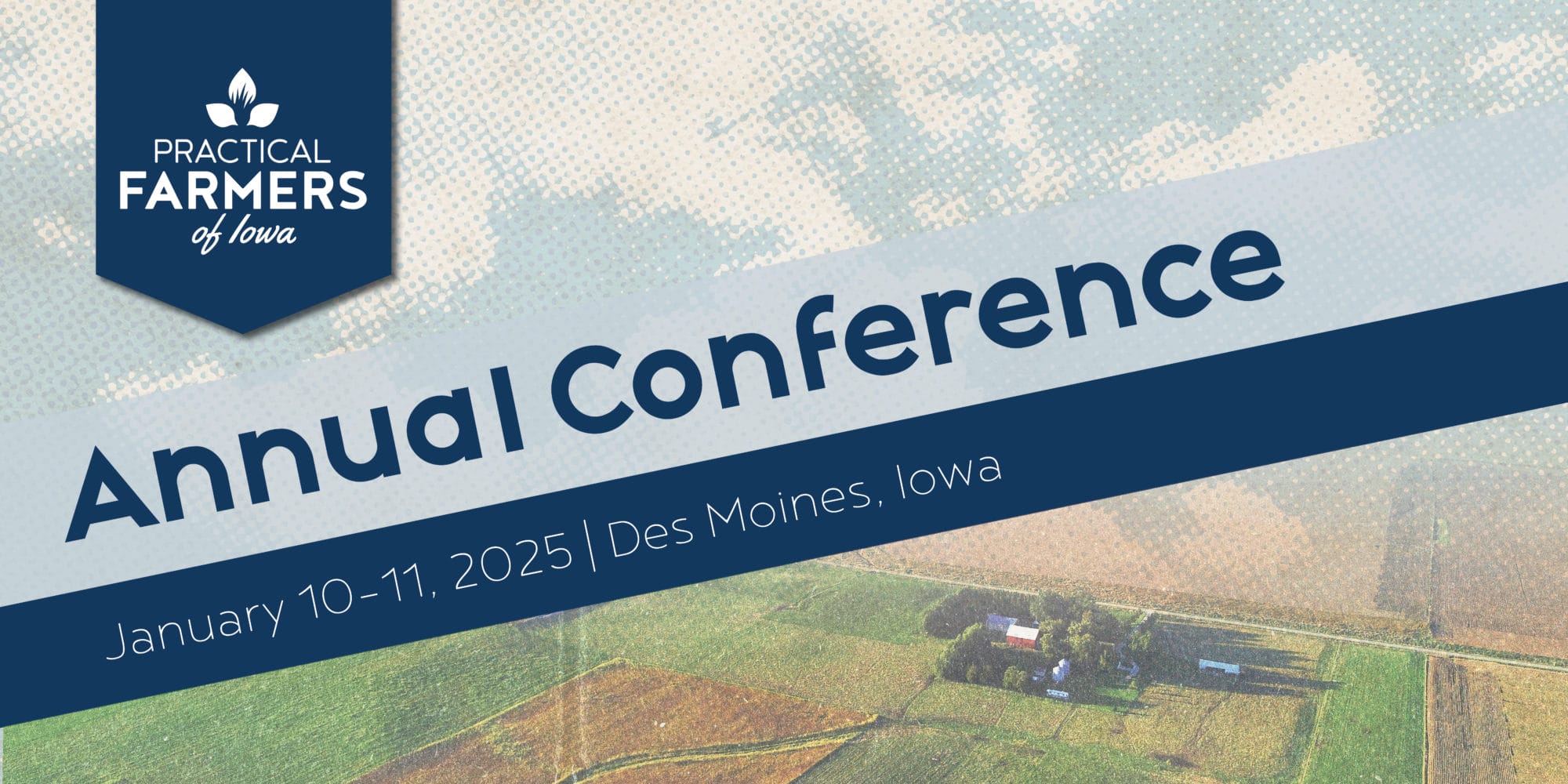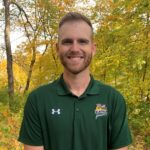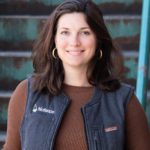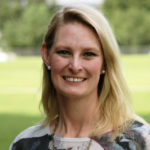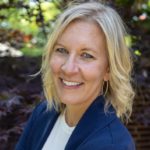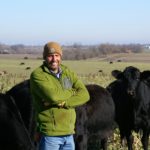Schedule
Thursday, Jan. 9
- 12:30-1:30 p.m. | Short Courses Check-in
- 1:30-6 p.m. | Short Courses
Friday, Jan. 10
- 8-11 a.m. | Short Courses Continue
- 11 a.m. | Conference Registration Opens
- 11 a.m. | Exhibit Hall Opens
- 11 a.m.-Noon | Lunch (Short Course Attendees & Exhibitors Only)
- 12:30-1:30 p.m. | Concurrent Session 1
- 2-3 p.m. | Concurrent Session 2
- 3:30-4:30 p.m. | Concurrent Session 3
- 4:45-5:45 p.m. | Storytelling
- 5:45-6:15 p.m. | Cocktail Hour
- 6:15-10 p.m. | PFI Dinner
Saturday, Jan. 11
- 7:30-8:30 a.m. | Breakfast, Affinity Groups & Exhibit Hall – Sponsored by Sunderman Farm Management Co.
- 8:30-9:30 a.m. | Keynote Address
- 10-11 a.m. | Concurrent Session 1
- 11 a.m.-12:30 p.m. | Lunch & Exhibit Hall
- 12:30-1:30 p.m. | PFI Business Meeting
- 1:45-2:45 p.m. | Concurrent Session 2
- 3:15-4:15 p.m. | Concurrent Session 3
- 4:30-5:30 p.m. | Concurrent Session 4
Annual Conference Breakout Sessions & Speakers
Friday Session 1: 12:30-1:30 p.m.
The Rules and Regulations of Starting a Chicken Operation
Trent Butler
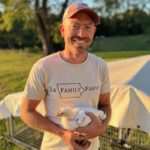 Trent Butler is in his second year co-owning and operating BA Family Farms, a 5-acre farm in Indianola, Iowa, where he raises pastured poultry for meat and eggs, bees and produce with a focus on regenerative agriculture. All of the farm’s farm products are sold directly to consumers via markets. Trent also works for the Meat and Poultry Inspection Bureau of the Iowa Department of Agriculture and Land Stewardship.
Trent Butler is in his second year co-owning and operating BA Family Farms, a 5-acre farm in Indianola, Iowa, where he raises pastured poultry for meat and eggs, bees and produce with a focus on regenerative agriculture. All of the farm’s farm products are sold directly to consumers via markets. Trent also works for the Meat and Poultry Inspection Bureau of the Iowa Department of Agriculture and Land Stewardship.
Considering starting a poultry operation? Come hear beginning farmer Trent Butler share insights on setting up an efficient, compliant and affordable poultry operation that’s manageable for beginning farmers with busy schedules and off-farm jobs.
(Trying) Till It’s Right: Exploring Conservation Tillage Methods Following a Cover Crop
Landon Brown and Jacob Bolson
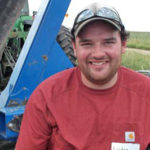 Landon Brown raises corn and soybeans, along with relay-cropping soybeans, rye and oats, near New Providence, Iowa. He uses no-till and cover crops on all his acres to help reduce erosion and reliance on chemical control. Landon has taken part in various PFI research trials related to cover crop management practices in the past three years.
Landon Brown raises corn and soybeans, along with relay-cropping soybeans, rye and oats, near New Providence, Iowa. He uses no-till and cover crops on all his acres to help reduce erosion and reliance on chemical control. Landon has taken part in various PFI research trials related to cover crop management practices in the past three years.
 Jacob Bolson lives with his wife, Lindsay, and their four children on an acreage outside of Hubbard, Iowa. He has a full-time job while also focusing on increasing cover crop and conservation practices on his own farm, which he found through PFI’s Find A Farmer program, and on acres operated by extended family. Jacob also leads the operations for a custom cover crop business.
Jacob Bolson lives with his wife, Lindsay, and their four children on an acreage outside of Hubbard, Iowa. He has a full-time job while also focusing on increasing cover crop and conservation practices on his own farm, which he found through PFI’s Find A Farmer program, and on acres operated by extended family. Jacob also leads the operations for a custom cover crop business.
Many farmers are trying out conservation tillage methods in an effort to reduce erosion, nutrient loss and compaction. Each method has its tricks, and though no-till may be best for conservation, some have found that strip-till or minimum-till offer various benefits to production systems. Neighbors Landon Brown and Jacob Bolson will share what they’ve learned about tillage, including Landon’s results from his PFI-supported research trial comparing yield following strip-till and no-till at planting.
Equipping Farms to Minimize Weed Pressure
Eric Mahaney
 Eric Mahaney grows organic row crops in southwest Iowa and is also an entrepreneur experienced in marketing and agricultural business. He has created multiple start-up companies, the most recent being a cover crop application and equipment sales business. The mission of his businesses revolves around innovative on-farm applications and offering services and products directly to consumers.
Eric Mahaney grows organic row crops in southwest Iowa and is also an entrepreneur experienced in marketing and agricultural business. He has created multiple start-up companies, the most recent being a cover crop application and equipment sales business. The mission of his businesses revolves around innovative on-farm applications and offering services and products directly to consumers.
Reducing weed pressure is an almost universal desire for farmers, but there are many ways to do so, including cover cropping and mechanical weed control – especially for organic operations. Find out how organic farmer Eric Mahaney has found success for his farm and cover crop business. He’ll discuss equipment he uses both for cover crop planting and mechanical weed control.
Travels With Ruth In Search Of Conservation Ideas
Ruth McCabe
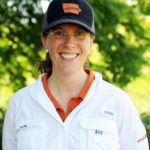 Ruth McCabe is a certified professional agronomist, an Iowa certified crop advisor and a conservation agronomist with Heartland Cooperative. She works directly with farmers to add in-field and edge-of-field conservation practices to benefit soil health, water quality and wildlife. In 2022 she was selected as a Nuffield Scholar to study conservation farming adoption around the world.
Ruth McCabe is a certified professional agronomist, an Iowa certified crop advisor and a conservation agronomist with Heartland Cooperative. She works directly with farmers to add in-field and edge-of-field conservation practices to benefit soil health, water quality and wildlife. In 2022 she was selected as a Nuffield Scholar to study conservation farming adoption around the world.
In 2022 and 2023, Ruth and her class of Nuffield Scholars set out on a global tour of farms and agriculture. Ruth focused on conservation practices, including in-field practices and decision-making, and what ideas might be workable (or not!) in Iowa. In this session, Ruth will share scenes, stories and takeaways from visiting farms and watersheds in Australia, England, Borneo, Brazil, Canada, Denmark and the Chesapeake Bay.
Building Sustainable Landowner-Tenant Relationships
Mike Richards
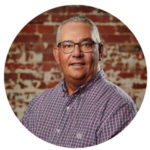 Mike Richards has extensive background in crop scouting, sales, farm operations and management, as well as precision agriculture. He manages his family’s century farm, and also worked as an associate agriculture instructor at Iowa Central Community College. Mike is a licensed crop insurance agent and real estate professional.
Mike Richards has extensive background in crop scouting, sales, farm operations and management, as well as precision agriculture. He manages his family’s century farm, and also worked as an associate agriculture instructor at Iowa Central Community College. Mike is a licensed crop insurance agent and real estate professional.
Nurturing landowner-tenant relationships is the beginning of a sustainable approach to managing assets. Handling these important conversations requires using the three “C’s” in land management: communication, conservation and collaboration. Join land manager Mike Richards as he discusses the various strategies landowners and tenants can use to collaboratively answer pressing concerns, such as taking high inputs out of low-input land, tackling conservation rental payments and maintaining sustainable yields and profits.
Farmers and Food Hubs: A Conversation About What’s Working, What’s Not and What’s Next
Peter Kraus, Ashley Wenke, Teresa Wiemerslage
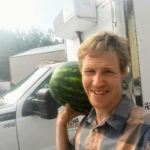 Peter Kraus’ various experiences in kitchens and on farms have come together in his current role managing the Iowa Food Hub. After riding out the early days of the COVID-19 pandemic, Peter has helped grow the Iowa Food Hub’s operations and positively impact the local producers he cares about. Peter finds joy in exploring the world through food, while also maintaining a strong connection to the Midwest’s Driftless Region. Having experienced many distinct regional cuisines around the world, his work to identify Driftless cuisine is an ongoing project.
Peter Kraus’ various experiences in kitchens and on farms have come together in his current role managing the Iowa Food Hub. After riding out the early days of the COVID-19 pandemic, Peter has helped grow the Iowa Food Hub’s operations and positively impact the local producers he cares about. Peter finds joy in exploring the world through food, while also maintaining a strong connection to the Midwest’s Driftless Region. Having experienced many distinct regional cuisines around the world, his work to identify Driftless cuisine is an ongoing project.
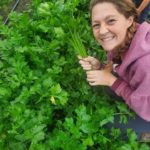 Ashley Wenke and her husband, Zachary Wenke, operate Pleasant Grove Homestead near Montezuma, Iowa, providing meat, produce, eggs and honey to surrounding communities through farmers markets, cooperatives and other direct-to-consumer channels. They also work with a variety of food hubs to extend their market reach. In 2023, they raised over 1,500 meat birds, 300 laying hens and diverse vegetables in three high tunnels and a large market garden. In 2024, Ashely and Zach won Iowa Farm Bureau’s Grow Your Future Award. They are current participants in PFI’s Savings Incentive Program and past participants in PFI’s Produce Safety Cost-Share program.
Ashley Wenke and her husband, Zachary Wenke, operate Pleasant Grove Homestead near Montezuma, Iowa, providing meat, produce, eggs and honey to surrounding communities through farmers markets, cooperatives and other direct-to-consumer channels. They also work with a variety of food hubs to extend their market reach. In 2023, they raised over 1,500 meat birds, 300 laying hens and diverse vegetables in three high tunnels and a large market garden. In 2024, Ashely and Zach won Iowa Farm Bureau’s Grow Your Future Award. They are current participants in PFI’s Savings Incentive Program and past participants in PFI’s Produce Safety Cost-Share program.
 Teresa Wiemerslage is a farm, food and enterprise development education extension field specialist with ISU Extension and Outreach. She is also a cofounder of the Iowa Food Hub and an organizer of the Food Hub Managers Working Group. In her extension role, Teresa specializes in farm-to-school and early care; food hubs and supply chain logistics; and on-farm food safety and GAP certification.
Teresa Wiemerslage is a farm, food and enterprise development education extension field specialist with ISU Extension and Outreach. She is also a cofounder of the Iowa Food Hub and an organizer of the Food Hub Managers Working Group. In her extension role, Teresa specializes in farm-to-school and early care; food hubs and supply chain logistics; and on-farm food safety and GAP certification.
Iowa’s food system is changing. Thanks to programs like Iowa’s Local Food Purchasing Assistance and Local Food for Schools programs, and the work of Iowa’s local food farmers and food hubs, Iowans have gotten a glimpse of what is possible with local food distributed through larger networks. Yet that work is not easy or simple, nor is it finished. So let’s take a moment to check in with farmers and food hubs about how things are going. What’s working? What’s not working? What fixes, big or small, would help?
Teresa Wiemerslage will moderate as Peter Kraus of the Iowa Food Hub and Ashley Wenke of Pleasant Grove Homestead share their perspectives and invite attendees to join the conversation.
Flower Farm Financials
John Hendrickson
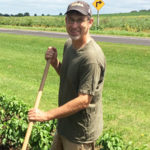 John Hendrickson is a farm viability specialist at the Center for Integrated Agricultural Systems at University of Wisconsin-Madison. His work focuses on farm management and profitability, with an emphasis on specialty crops. He conducts farm financial benchmarking research and develops tools to help farmers calculate their cost of production, measure enterprise profitability and manage their farm businesses to be sustainably profitable. In the past, John operated his own certified organic vegetable farm.
John Hendrickson is a farm viability specialist at the Center for Integrated Agricultural Systems at University of Wisconsin-Madison. His work focuses on farm management and profitability, with an emphasis on specialty crops. He conducts farm financial benchmarking research and develops tools to help farmers calculate their cost of production, measure enterprise profitability and manage their farm businesses to be sustainably profitable. In the past, John operated his own certified organic vegetable farm.
Assessing crop-by-crop profitability is an elusive challenge, but John Hendrickson is part of a team at the University of Wisconsin-Madison working to find answers. Part of that work involves developing free tools and resources farmers can use to understand their cost of production and improve decision-making, pricing and whole-farm planning capacity.
The team’s “Compass Tools” are designed to help “point the way to profitability” for a range of enterprises, especially specialty crops. In this session, hear from John about how to use Compass Tools to analyze cut-flower production and markets. He will also share early data from a research project examining financial benchmarks on flower farms, such as gross and net income per acre and other metrics.
Incorporating Hybrid Rye Into Hog Feed
Tom Frantzen and Jon Jovaag
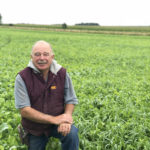 Tom Frantzen farms 320 certified organic acres at Frantzen Farm north of New Hampton, Iowa, with his wife, Irene Frantzen, son James and daughter-in-law Amanda. They currently raise corn, soybeans, small grains, hay and pasture, as well as 30 brood cows. As Tom and Irene are semi-retired, their farrow-to-finish hog operation ended after 50 years.
Tom Frantzen farms 320 certified organic acres at Frantzen Farm north of New Hampton, Iowa, with his wife, Irene Frantzen, son James and daughter-in-law Amanda. They currently raise corn, soybeans, small grains, hay and pasture, as well as 30 brood cows. As Tom and Irene are semi-retired, their farrow-to-finish hog operation ended after 50 years.
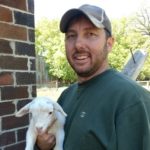 Jon Jovaag is a farmer on a multi-generational, diversified and certified organic family farm near Austin, Minnesota. For many years, Jon – along with wife Ruth and parents Arvid and Lois – have focused on regenerative and diverse farming practices as they work together to try to improve soil health and water quality while maintaining profitability. They have raised many different cash crops along with pigs, cattle, sheep and chickens. Farming for Jon has been a rewarding, educational and challenging experience – he could not imagine doing anything else.
Jon Jovaag is a farmer on a multi-generational, diversified and certified organic family farm near Austin, Minnesota. For many years, Jon – along with wife Ruth and parents Arvid and Lois – have focused on regenerative and diverse farming practices as they work together to try to improve soil health and water quality while maintaining profitability. They have raised many different cash crops along with pigs, cattle, sheep and chickens. Farming for Jon has been a rewarding, educational and challenging experience – he could not imagine doing anything else.
Hybrid rye is a high-fiber, lower-energy grain commonly fed to pigs in Europe. To test how well hybrid rye worked as a feed for organic pigs, the Frantzens raised hybrid rye on their farm and then used it to replace half of the corn in their standard ration. Come hear Tom share what he learned as part of this five-year on-farm research trial, which involved multiple cooperators. He’ll also share his experience with raising hogs for 50 years.
Pasturing Pigs While Rooting For the Prairie
April Prusia
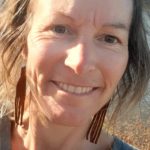 April Prusia is the owner and operator of Dorothy’s Range, a small-scale pork operation specializing in farrrow-to-finish hogs near Blanchardville, Wisconsin. She is also a retired vegetarian and the founder and president of Meatsmith Co-op. April spends her extra time serving her community on many boards, hosting guests at her Airbnb and teaching and sharing her belief that how we eat can change the world. April has been farming for two decades, and is a food activist, citizen scientist and community organizer in Wisconsin’s Driftless Region.
April Prusia is the owner and operator of Dorothy’s Range, a small-scale pork operation specializing in farrrow-to-finish hogs near Blanchardville, Wisconsin. She is also a retired vegetarian and the founder and president of Meatsmith Co-op. April spends her extra time serving her community on many boards, hosting guests at her Airbnb and teaching and sharing her belief that how we eat can change the world. April has been farming for two decades, and is a food activist, citizen scientist and community organizer in Wisconsin’s Driftless Region.
Pigs are often said to be too hard on the ground to use for restoration, outside of bulldozing brush. But by adapting the patch burn grazing method, usually used for cattle in the West, April has been using her pigs to encourage native prairie growth by targeting cool-season grasses and aiding soil contact for new native warm-season plantings. Join April in this session to hear her experiences and advice. She’ll share how she balances raising hogs while fostering a place for native prairie restoration.
Explora la Apicultura
Randall Cass
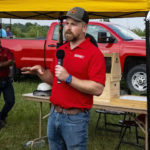 Randall Cass se unió a la Universidad Estatal de Iowa en 2017, convirtiéndose en el primer especialista en extensión de abejas de la institución en más de 70 años. En su cargo, coordina la investigación sobre las abejas, administra el colmenar de miel de la universidad, da conferencias y desarrolla programas de divulgación para apicultores, agricultores y propietarios de tierras.
Randall Cass se unió a la Universidad Estatal de Iowa en 2017, convirtiéndose en el primer especialista en extensión de abejas de la institución en más de 70 años. En su cargo, coordina la investigación sobre las abejas, administra el colmenar de miel de la universidad, da conferencias y desarrolla programas de divulgación para apicultores, agricultores y propietarios de tierras.
¿Estás interesado en convertirte en apicultor? Únete a nuestra sesión para aprender todo lo que necesitas saber antes de empezar. ¡Responderemos todas sus preguntas sobre la biología de las abejas, las picaduras de abejas, la miel, los costos de los equipos, las expectativas laborales y más!
Friday Session 2: 2-3 p.m.
Foundations of Business Planning
Grant Brooke
 Grant Brooke is a partner at Grey Swan, an investment firm dedicated to making a positive impact through regenerative agriculture. Previously an agriculture entrepreneur himself, Grant has raised over $150 million in capital for his ventures and exited them to top global investors. Grey Swan is an evergreen fund that specializes in supporting projects focused on water and soil conservation.
Grant Brooke is a partner at Grey Swan, an investment firm dedicated to making a positive impact through regenerative agriculture. Previously an agriculture entrepreneur himself, Grant has raised over $150 million in capital for his ventures and exited them to top global investors. Grey Swan is an evergreen fund that specializes in supporting projects focused on water and soil conservation.
Listen as Grant Brooke of Grey Swan walks us through constructing your business foundations for success, including going into entrepreneurship with open eyes, redefining success and weighing your risk tolerance for scaling up. He’ll cover necessities in early-business planning, choosing the right business entity for your farm, establishing accountability tools and avoiding early financial pitfalls.
Let the Dough Rise: Elevating Small-Grain Sales Through Direct Marketing
Ben Penner
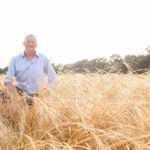 Ben Penner grows organic small grains and continuous living cover crops like Kernza and winter camelina on his farm near Mankato, Minnesota. As consultant for various organizations, he focuses on developing new marketing and sales channels through distribution networks.
Ben Penner grows organic small grains and continuous living cover crops like Kernza and winter camelina on his farm near Mankato, Minnesota. As consultant for various organizations, he focuses on developing new marketing and sales channels through distribution networks.
Finding markets for food-grade small grains can be tricky, but demand for locally grown artisan grains is on the rise. Ben Penner has been exploring market opportunities for the perennial grain, Kernza, and heritage wheat varieties he grows on his own farm. Learn Ben’s tips for growing and direct-marketing small grains as part of his effort to promote regenerative farming practices and sustainably sourced food.
Organic Pest Management for Row Crops
Kathleen Delate
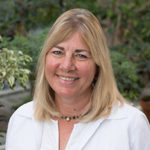 Kathleen Delate is a professor and extension organic specialist at ISU. In this role, she leads organic research and education for both horticulture and agronomy programs. Her research focuses on pest and soil fertility management strategies for transitioning and certified organic farmers.
Kathleen Delate is a professor and extension organic specialist at ISU. In this role, she leads organic research and education for both horticulture and agronomy programs. Her research focuses on pest and soil fertility management strategies for transitioning and certified organic farmers.
With every season comes varied potential for insect pressure in organic crops. Large-scale organic row crop operations face a challenge of scale to address and lessen pest issues. Explore your options and learn how to develop a management strategy with organic pest management specialist Kathleen Delate of Iowa State University.
Wide-Row Corn: Opportunities, Challenges and Potential Rewards
Todd Whiting, Bob Recker
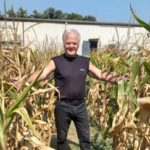 Todd Whiting is a retired John Deere engineer who has worked independently and alongside fellow researcher Bob Recker to evaluate wide-row corn in north-central Iowa. Research efforts have focused on growing a companion cash crop between the high-density corn rows.
Todd Whiting is a retired John Deere engineer who has worked independently and alongside fellow researcher Bob Recker to evaluate wide-row corn in north-central Iowa. Research efforts have focused on growing a companion cash crop between the high-density corn rows.
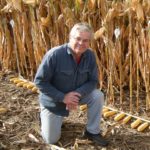 Bob Recker, a retired John Deere engineer, has been researching wide-row corn and working with farmers for several years. He has looked at soil health, water, cover and companion crop growth, effects on corn yield and more. His current emphasis is on what he describes as farmers’ “triple bottom line.”
Bob Recker, a retired John Deere engineer, has been researching wide-row corn and working with farmers for several years. He has looked at soil health, water, cover and companion crop growth, effects on corn yield and more. His current emphasis is on what he describes as farmers’ “triple bottom line.”
Bob Recker and Todd Whiting, both retired engineers from John Deere, have been investigating wide-row corn for several years. In this session, they’ll discuss their observations about corn grain yield, weed pressure and weed control strategies. They’ll discuss how the wider gap between corn rows creates an “opportunity space” that opens possibilities for farmers, including the ability to plant other crops.
Adding Agroforestry To Diversify Income and Improve Wildlife Habitat
Elana Gingerich, Bailey Yotter
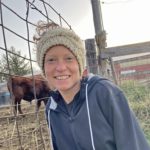 Elana Gingerich grew up on a conventional hog operation but developed a passion for tree crops. Today, she operates Olivia’s Orchard (formerly East Holbrook Chestnut Grove), a 40-acre farm near Parnell, Iowa, with over 10 acres of chestnut trees, a few acres of pawpaw trees and a handful of other fruit and nut trees. Grass-finished beef cattle play a crucial role on the farm: They are rotationally grazed to manage pasture and timber. Elana also operates a nursery supplying chestnut and pawpaw trees for other growers who want to get started in agroforestry.
Elana Gingerich grew up on a conventional hog operation but developed a passion for tree crops. Today, she operates Olivia’s Orchard (formerly East Holbrook Chestnut Grove), a 40-acre farm near Parnell, Iowa, with over 10 acres of chestnut trees, a few acres of pawpaw trees and a handful of other fruit and nut trees. Grass-finished beef cattle play a crucial role on the farm: They are rotationally grazed to manage pasture and timber. Elana also operates a nursery supplying chestnut and pawpaw trees for other growers who want to get started in agroforestry.
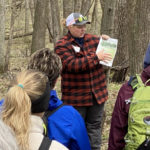 Bailey Yotter has been Iowa’s state forester since February 2024. Prior to her time with NRCS, she was an area forester with the National Wild Turkey Federation, covering southeast Iowa for nearly four years. From 2013-2019, Bailey acted as a consultant forester in central Missouri. She holds a bachelor’s degree in forest resource management from University of Missouri-Columbia.
Bailey Yotter has been Iowa’s state forester since February 2024. Prior to her time with NRCS, she was an area forester with the National Wild Turkey Federation, covering southeast Iowa for nearly four years. From 2013-2019, Bailey acted as a consultant forester in central Missouri. She holds a bachelor’s degree in forest resource management from University of Missouri-Columbia.
Have you ever wondered about adding agroforestry practices to your farm operations, but don’t know where to start? From old forest stands to newly planted trees, agroforestry incorporates all aspects of your property. Join Elana Gingerich of Olivia’s Orchard and Bailey Yotter, state forester for Iowa Natural Resources Conservation Service, as they describe ways to integrate fruit- and nut-producing trees into an existing conventional farming system. They’ll also discuss financial assistance programs that can help make it happen
“What in the Weather?” LIVE
Dan Fillius, Justin Glisan, Madelynn Wuestenberg
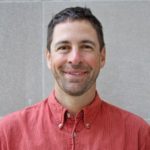 Dan Fillius is the commercial vegetable and specialty crop specialist with ISU Extension and Outreach. Prior to this role, Dan spent more than 12 years managing vegetable farms in Michigan, Minnesota and Iowa. He brings a wealth of practical knowledge and vision to commercial horticulture in Iowa.
Dan Fillius is the commercial vegetable and specialty crop specialist with ISU Extension and Outreach. Prior to this role, Dan spent more than 12 years managing vegetable farms in Michigan, Minnesota and Iowa. He brings a wealth of practical knowledge and vision to commercial horticulture in Iowa.
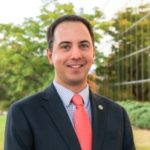 As Iowa’s state climatologist, Justin Glisan compiles and processes Iowa climate data for current and future weather data research needs. Justin graduated from ISU in 2012 and continued as a post-doctoral atmospheric scientist until he was hired by ISU as a research atmospheric scientist. He has also taken part in many research projects at Iowa State and the University of Missouri, including in-depth research on extreme precipitation and temperature extremes and their causal mechanisms.
As Iowa’s state climatologist, Justin Glisan compiles and processes Iowa climate data for current and future weather data research needs. Justin graduated from ISU in 2012 and continued as a post-doctoral atmospheric scientist until he was hired by ISU as a research atmospheric scientist. He has also taken part in many research projects at Iowa State and the University of Missouri, including in-depth research on extreme precipitation and temperature extremes and their causal mechanisms.
 Madelynn Wuestenberg is an agricultural climatology specialist with ISU Extension and Outreach working with farmers and the farm community to support climate resilience in Iowa’s agricultural and food systems. She earned her bachelor’s degree in meteorology from ISU in 2022 and her master’s degree in agricultural meteorology in 2023. Madelynn grew up in Slater, Iowa, and both of her parents come from farming families.
Madelynn Wuestenberg is an agricultural climatology specialist with ISU Extension and Outreach working with farmers and the farm community to support climate resilience in Iowa’s agricultural and food systems. She earned her bachelor’s degree in meteorology from ISU in 2022 and her master’s degree in agricultural meteorology in 2023. Madelynn grew up in Slater, Iowa, and both of her parents come from farming families.
On the podcast “What in the Weather?,” horticulture field specialist Dan Fillius and agricultural climatology specialist Madelynn Wuesetenberg from ISU Extension and Outreach join Justin Glisan, Iowa’s state climatologist, to discuss what is happening in the world of Iowa weather. Every week during the main growing season, they discuss recent weather and its impacts on fruits and vegetables and provide a state climate outlook for the coming week. For regular listeners and newbies alike, this session will bring eye-opening facts and tests of knowledge as the team looks back over the highs and lows of 2024’s weather.
Iowa’s Insurance Landscape: Challenges and Paths Forward
Doug Ommen
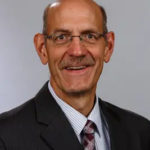 As insurance commissioner for the state of Iowa, Doug Ommen leads the Iowa Insurance Division, which is the state regulator that supervises all insurance business transacted in Iowa. He was appointed by Governor Terry Branstad in January 2017, after serving as interim commissioner since December 2016. Doug has a strong and varied public service background. His dedication to serving the public began while seeking justice for victims of fraud in the Missouri Attorney General’s Office. Over three decades there, he led the fight to protect consumers, first as an assistant attorney general and then as chief counsel.
As insurance commissioner for the state of Iowa, Doug Ommen leads the Iowa Insurance Division, which is the state regulator that supervises all insurance business transacted in Iowa. He was appointed by Governor Terry Branstad in January 2017, after serving as interim commissioner since December 2016. Doug has a strong and varied public service background. His dedication to serving the public began while seeking justice for victims of fraud in the Missouri Attorney General’s Office. Over three decades there, he led the fight to protect consumers, first as an assistant attorney general and then as chief counsel.
Across Iowa, farmers are encountering challenges with property and liability insurance, from cancellation of coverage to increases in premiums, that put their businesses at risk. This past spring, PFI hosted a series of virtual meetups for farmers to share their experiences and engage with policymakers and officials. In this session, Jacqueline Venner Senske will moderate as PFI welcomes Doug Ommen, insurance commissioner for the state of Iowa, who will describe the role of the Iowa Insurance Division, offer insights about the insurance industry and engage in discussions about paths forward.
Making Pasture Pencil Out
Zach Knutson
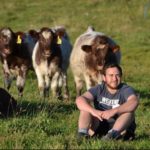 Zach Knutson farms near Zumbrota, Minnesota, where he has converted over 100 acres of row crop ground to perennial pastures using several methods. He rotationally grazes registered shorthorn seedstock and Katahdin hair sheep on these multispecies pastures. He has used continuous cover crops, nurse crops and no-till drilling to transition the former conventional row crop ground to thriving perennial pastures. During this whole-farm transition, Zach also evaluated forage quality and soil properties in each field.
Zach Knutson farms near Zumbrota, Minnesota, where he has converted over 100 acres of row crop ground to perennial pastures using several methods. He rotationally grazes registered shorthorn seedstock and Katahdin hair sheep on these multispecies pastures. He has used continuous cover crops, nurse crops and no-till drilling to transition the former conventional row crop ground to thriving perennial pastures. During this whole-farm transition, Zach also evaluated forage quality and soil properties in each field.
It’s a big decision to convert row crop to pasture ground. Before diving headfirst, you’ll want to know some numbers. In this session, Zach will discuss the costs and benefits of three conversion approaches. He’ll also share the hay and grazing yields he’s experienced in both drought and heavy rainfall seasons on fields ranging from 60-75 CPI to 90-95 CPI to give you an idea of what you can expect post-conversion.
The Bottom Line of Grazing: Crunching the Numbers on Cover Crops
James Holz
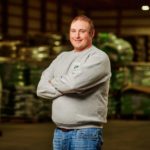 James Holz raises cattle, row crops, small grains and his family near Grand Junction, Iowa. He is also the co-owner of Iowa Cover Crop, a full-service cover crop seed and application business located in Jefferson, Iowa, with a dealer network spanning Iowa and surrounding states. When he’s not busy on the farm or in the seedhouse, he enjoys flying his 1946 Stinson airplane, dreaming up new business ideas and cheering on the Cyclones.
James Holz raises cattle, row crops, small grains and his family near Grand Junction, Iowa. He is also the co-owner of Iowa Cover Crop, a full-service cover crop seed and application business located in Jefferson, Iowa, with a dealer network spanning Iowa and surrounding states. When he’s not busy on the farm or in the seedhouse, he enjoys flying his 1946 Stinson airplane, dreaming up new business ideas and cheering on the Cyclones.
Curious about why folks grazing cover crops think it’s worth the work? Join James Holz as he shares why the economics of getting livestock on the land make sense. Whether you’re looking to cut feed costs, improve land efficiency or boost overall profitability, James will share real-world numbers and practical examples showing why grazing cover crops is an investment worth making.
Viva los Sueños de Pastoreo Rotacional con Chivos Vivos
Jenny Horner
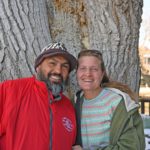 Jenny Horner y su familia administran Spring Lake Organic Farm en Red Oak, Iowa. Lo que comenzó como un pasatiempo de jardinería se convirtió en una operación orgánica certificada que vendía cultivos hortícolas especiales en su mercado de agricultores local y cultivaba alrededor de 100 acres de heno. Las cabras son la última incorporación a la granja para ayudar a revivir la tierra con pastoreo rotativo.
Jenny Horner y su familia administran Spring Lake Organic Farm en Red Oak, Iowa. Lo que comenzó como un pasatiempo de jardinería se convirtió en una operación orgánica certificada que vendía cultivos hortícolas especiales en su mercado de agricultores local y cultivaba alrededor de 100 acres de heno. Las cabras son la última incorporación a la granja para ayudar a revivir la tierra con pastoreo rotativo.
Jenny Horner y Emilio Moreno se dedican a la cría de cabras desde hace unos años. Se enfrentaron a una curva de aprendizaje con el ganado, pero la abordaron con el apoyo de su comunidad local, familiares y amigos y la red PFI. Jenny compartirá cómo ella y Emilio comenzaron, dónde están ahora y qué les depara el futuro. Venga a escuchar a un granjero principiante sobre el pastoreo y la importancia de la comunidad.
Friday Session 3: 3:30-4:30 p.m.
The Highs, Lows and Good-to-Knows of Raising Beef: Scaling a Direct-to-Consumer Operation as First-Generation Farmers
Tessa Parks
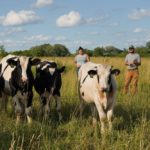 First-generation farmers Tessa Parks and Wyatt Parks own and operate W.T. Farms, a direct-to-consumer beef operation raising Holstein steers from calf to butcher. They also produce certified organic hay for themselves and for sale on 100% rental ground. Tessa and Wyatt graze certified organic pasture at Sharing Our Roots Farm in Northfield, Minnesota, and are part of a larger land transition from conventional commodity row crop farming to a resilient and regenerative farm landscape.
First-generation farmers Tessa Parks and Wyatt Parks own and operate W.T. Farms, a direct-to-consumer beef operation raising Holstein steers from calf to butcher. They also produce certified organic hay for themselves and for sale on 100% rental ground. Tessa and Wyatt graze certified organic pasture at Sharing Our Roots Farm in Northfield, Minnesota, and are part of a larger land transition from conventional commodity row crop farming to a resilient and regenerative farm landscape.
Are you a beginning farmer interested in raising direct-to-consumer beef? Yearly (and sometimes daily), Tessa and Wyatt assess their operation, consider the going rate for calves and scale their operation according to their own limits and assets, including equipment and the demands of off-farm work. In this session, Tessa will outline the components of that assessment. You’ll walk away with some ideas on how you can keep your farm at a scale that fits you – and the knowledge that at least your freezer will never be empty.
Cropping Cloth: The Potential of Flax for Linen
Leslie Schroeder
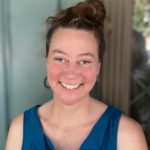 Leslie Schroeder is a cofounder of Midwest Linen Revival (formally Wisconsin Linen Revival), which is working to establish flax for fiber as an environmentally sustainable crop in the Midwest. Her background in textiles is self-taught and includes sewing, knitting, weaving and hand-processing deer hides into buckskin. With her current work, Leslie is transitioning her curiosity with growing flax at a garden scale into work toward market-scale production in the Midwest.
Leslie Schroeder is a cofounder of Midwest Linen Revival (formally Wisconsin Linen Revival), which is working to establish flax for fiber as an environmentally sustainable crop in the Midwest. Her background in textiles is self-taught and includes sewing, knitting, weaving and hand-processing deer hides into buckskin. With her current work, Leslie is transitioning her curiosity with growing flax at a garden scale into work toward market-scale production in the Midwest.
Flax is an ancient plant that’s versatile and can be grown in the Midwest. Midwest Linen Revival is working to establish flax for fiber as an agricultural crop in the region. This session will cover barriers to growing and processing flax, results of in-field experiments exploring planting and harvesting it and information about a seed breeding program to develop a Midwest-specific, climate-resilient seed.
Seeking Small-Grains Markets: Generating Ideas To Support Diverse Rotations
Landon Plagge
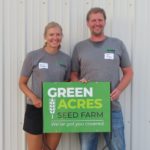 Landon Plagge operates Plagge Farms Inc. with his wife, Anne Plagge, near Latimer, Iowa, and Green Acres Milling in Albert Lea, Minnesota. Together with family, they raise oats, corn, soybeans, livestock and a variety of cover crops. They use cover crops and no-till on all of their acres with a focus on reducing synthetic inputs. The Plagges also run a manure handling operation that involves writing environmental plans, brokering and applying manure as natural fertilizer. Green Acres Milling is focused on bringing sustainable, economically viable third crops to the region.
Landon Plagge operates Plagge Farms Inc. with his wife, Anne Plagge, near Latimer, Iowa, and Green Acres Milling in Albert Lea, Minnesota. Together with family, they raise oats, corn, soybeans, livestock and a variety of cover crops. They use cover crops and no-till on all of their acres with a focus on reducing synthetic inputs. The Plagges also run a manure handling operation that involves writing environmental plans, brokering and applying manure as natural fertilizer. Green Acres Milling is focused on bringing sustainable, economically viable third crops to the region.
In this roundtable session, discussion will revolve around three core topics: seeking markets for small grains; viable market options for the future of small grains in Iowa and the Midwest; and how to continue building market demand for crops that let farmers diversify their rotations. Facilitator Landon Plagge will help guide the conversation and provide input on his hopes for Midwest small-grains markets.
Meet-and-Greet at the Conference!
Whether it’s your first time at the conference or you’re a long-time attendee, it can be hard to strike up conversations with new people. In this “non-session,” we’ll spend the time passing the mic around the room so people can introduce themselves and then continue visiting as time allows. Don’t be a stranger!
Swapping Marginal Crops for Coveys: Using Data to Define Profitable Habitat Changes
Stephanie Nelson, Mark Peterson, Mary Buchanan, Nick Thompson
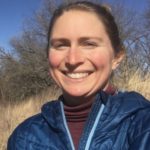 Stephanie Nelson is optimistic about opportunities for vibrant habitat to coexist with profitable farms in Iowa. As the Iowa precision agriculture and conservation specialist for Pheasants Forever, she analyzes data for farmers and landowners to help identify unprofitable areas they can target for conservation practices. She is a PFI member and the farmer owner of Tuuli Farm near Turin, Iowa, where she continues to create a diversified landscape.
Stephanie Nelson is optimistic about opportunities for vibrant habitat to coexist with profitable farms in Iowa. As the Iowa precision agriculture and conservation specialist for Pheasants Forever, she analyzes data for farmers and landowners to help identify unprofitable areas they can target for conservation practices. She is a PFI member and the farmer owner of Tuuli Farm near Turin, Iowa, where she continues to create a diversified landscape.
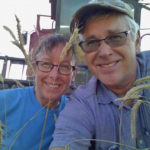 Mark Peterson farms about 500 acres of corn and soybeans with his wife, Melanie Peterson, at Bent Gate Farm near Stanton, Iowa. They also rent and are transferring acres to their son, Monroe, for his hay business. Mark is a past board president of PFI, and a long-time promoter of cover crops.
Mark Peterson farms about 500 acres of corn and soybeans with his wife, Melanie Peterson, at Bent Gate Farm near Stanton, Iowa. They also rent and are transferring acres to their son, Monroe, for his hay business. Mark is a past board president of PFI, and a long-time promoter of cover crops.
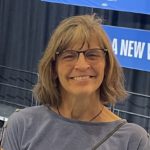 Mary Buchanan grew up in Iowa, got a chemistry degree from University of Northern Iowa and worked as a high school science teacher for 34 years, mostly in Wisconsin and California. After retiring, she and her husband returned to Iowa to the family homestead, eager to embrace retirement-level farming. They’ve been applying their scientific knowledge to gardening and converting cropland to Conservation Reserve Program prairie. Mary and her siblings also manage 100 acres of rented farmland, some of which they recently converted to prairie strips and planted with cover crops in partnership with Pheasants Forever.
Mary Buchanan grew up in Iowa, got a chemistry degree from University of Northern Iowa and worked as a high school science teacher for 34 years, mostly in Wisconsin and California. After retiring, she and her husband returned to Iowa to the family homestead, eager to embrace retirement-level farming. They’ve been applying their scientific knowledge to gardening and converting cropland to Conservation Reserve Program prairie. Mary and her siblings also manage 100 acres of rented farmland, some of which they recently converted to prairie strips and planted with cover crops in partnership with Pheasants Forever.
Nick Thompson is one of Pheasants Forever’s farm bill biologists in southwest Iowa. Using farm bill programs, Nick works with private landowners to create and enhance wildlife habitat on farms ranging in size from half an acre to 500-plus acres. His goal is to create diverse, native ecosystems where a suite of wildlife can thrive.
Did you know that quail coalesce into groups called coveys when they have the right habitat? Creating habitat in the right places can also improve your farm’s bottom line. Join this discussion with farmers Mary Buchanan and Mark Peterson, plus Pheasants Forever, to explore how to make conservation changes that make economic sense. Mary and Mark will share their experiences using Pheasants Forever’s free farm analysis to identify crop acres to shift to conservation. Stephanie Nelson and Nick Thompson from Pheasants Forever will highlight an innovative incentive to help you farm your best and conserve the rest.
Family Feud: Horticulture Edition
Sam Oschwald Tilton, Dan Fillius, John Hendrickson
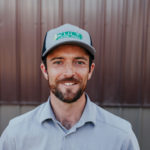 Sam Oschwald Tilton runs Glacial Drift Enterprises, where he consults with farmers, companies and organizations to improve weed management, draft farm plans and deliver engaging educational programming. Sam has worked in many roles on and around vegetable farms – as a farmhand, running his own CSA and managing an educational farm. He also worked throughout Europe and the U.S. as a sales rep for KULT-Kress weeding tools; was an instructor of sustainable landscape management at Lakeshore Technical College; and served as the direct-market vegetable specialist for University of Wisconsin-Madison Extension. For the past six years, Sam has organized the Midwest Mechanical Weed Control Field Day. He now lives in Minneapolis and enjoys sharing his love of plants with children in his community.
Sam Oschwald Tilton runs Glacial Drift Enterprises, where he consults with farmers, companies and organizations to improve weed management, draft farm plans and deliver engaging educational programming. Sam has worked in many roles on and around vegetable farms – as a farmhand, running his own CSA and managing an educational farm. He also worked throughout Europe and the U.S. as a sales rep for KULT-Kress weeding tools; was an instructor of sustainable landscape management at Lakeshore Technical College; and served as the direct-market vegetable specialist for University of Wisconsin-Madison Extension. For the past six years, Sam has organized the Midwest Mechanical Weed Control Field Day. He now lives in Minneapolis and enjoys sharing his love of plants with children in his community.
 Dan Fillius is the commercial vegetable and specialty crop specialist with ISU Extension and Outreach. Prior to this role, Dan spent more than 12 years managing vegetable farms in Michigan, Minnesota and Iowa. He brings a wealth of practical knowledge and vision to commercial horticulture in Iowa.
Dan Fillius is the commercial vegetable and specialty crop specialist with ISU Extension and Outreach. Prior to this role, Dan spent more than 12 years managing vegetable farms in Michigan, Minnesota and Iowa. He brings a wealth of practical knowledge and vision to commercial horticulture in Iowa.
 John Hendrickson is a farm viability specialist at the Center for Integrated Agricultural Systems at University of Wisconsin-Madison. His work focuses on farm management and profitability, with an emphasis on specialty crops. He conducts farm financial benchmarking research and develops tools to help farmers calculate their cost of production, measure enterprise profitability and manage their farm businesses to be sustainably profitable. In the past, John operated his own certified organic vegetable farm.
John Hendrickson is a farm viability specialist at the Center for Integrated Agricultural Systems at University of Wisconsin-Madison. His work focuses on farm management and profitability, with an emphasis on specialty crops. He conducts farm financial benchmarking research and develops tools to help farmers calculate their cost of production, measure enterprise profitability and manage their farm businesses to be sustainably profitable. In the past, John operated his own certified organic vegetable farm.
It’s time for … Family Feud: Horticulture Edition! As a follow-up to 2023’s conference session in the style of “The Price is Right,” the zany and educational horticulture game show crew is back by popular demand. Questions will highlight farm management and production issues, from record-keeping and equipment to pests, disease, food safety and more, covering the wide-ranging knowledge horticulture farmers need to succeed. Come learn, have fun and win fabulous prizes with this interactive game show-style session like no other. Survey says … good answer!
Fitting Farming Into Life
Morgan Hoenig
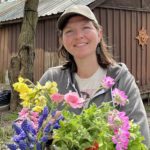 Morgan Hoenig has been farming for more than 15 years at Mogo Farms in Mt. Pleasant, Iowa. Her farm started as an organic vegetable farm, but she has diversified the farm to include floral design and greenhouse plant production. After farming full-time for several years, she started a family and found stability in picking up an off-farm job while still maintaining her farm business.
Morgan Hoenig has been farming for more than 15 years at Mogo Farms in Mt. Pleasant, Iowa. Her farm started as an organic vegetable farm, but she has diversified the farm to include floral design and greenhouse plant production. After farming full-time for several years, she started a family and found stability in picking up an off-farm job while still maintaining her farm business.
Farmer Morgan Hoenig evolved her farm over time to provide the boundaries and flexibility she needs to accommodate changing needs of her family and off-farm work. Morgan’s farm supports – but does not dominate – her life. Hear about the framework that has guided her decisions to find balance, and take part in a conversation about challenges and successes that come with fitting farming into life.
All Things Poultry Feed
Anna Pesek
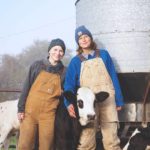 With her partner Shae, Anna Pesek co-owns Over the Moon Farm & Flowers LLC, a diversified direct-to-consumer livestock farm located in Delaware County, Iowa. The pair is also working to build their new business, Iowa Meat Marketplace LLC, a protein-specific food hub. Since 2019, Anna and Shae have been serving their community through a CSA and a la carte sales through their online farm store, along with developing wholesale clients for their products. Since June 2024, Anna has also served as PFI’s digital content coordinator.
With her partner Shae, Anna Pesek co-owns Over the Moon Farm & Flowers LLC, a diversified direct-to-consumer livestock farm located in Delaware County, Iowa. The pair is also working to build their new business, Iowa Meat Marketplace LLC, a protein-specific food hub. Since 2019, Anna and Shae have been serving their community through a CSA and a la carte sales through their online farm store, along with developing wholesale clients for their products. Since June 2024, Anna has also served as PFI’s digital content coordinator.
As some of the smallest livestock on the farm, poultry can have big reactions to small changes in their diets. Come hear from Anna as she shares the results of multiple on-farm research trials she’s participated in, along with years of experience feeding birds on pasture. In this session, Anna will discuss chickens, turkeys and ducks, so be prepared to learn fast and ask questions!
Things To Do, and Mistakes To Avoid, When Grazing Cover Crops
Ross Kurash
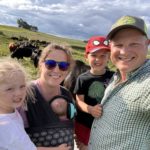 Ross Kurash and his family farm near Fort Atkinson, Iowa, producing corn, soybeans, rye, hay, beef cattle and pasture chickens. They no-till, cover crop all fields and plant cash crops into living covers. Cattle grazing is intensely managed on pasture, warm- and cool-season cover crops and crop residues. The Kurash family constantly evaluates and changes enterprises for economic and environmental sustainability while balancing family, fun and off-farm careers.
Ross Kurash and his family farm near Fort Atkinson, Iowa, producing corn, soybeans, rye, hay, beef cattle and pasture chickens. They no-till, cover crop all fields and plant cash crops into living covers. Cattle grazing is intensely managed on pasture, warm- and cool-season cover crops and crop residues. The Kurash family constantly evaluates and changes enterprises for economic and environmental sustainability while balancing family, fun and off-farm careers.
So, you’ve heard about all the benefits and now you’ve decided to give grazing cover crops a try. Come hear from Ross as he shares what he’s learned about the “how” of grazing covers. From fencing, to water, to avoiding soil compaction, Ross will give examples from his trial-and-error experiences with what works and what doesn’t. Not everything works as planned all the time, but Ross will give you an idea of the benefits to expect through perseverance.
Somos Tierra: La jornada de Un Agricultor Latino en Nebraska
Sandro Lopes
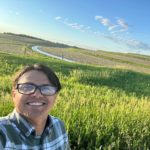 El fundador de NaTerra Regenerative Farm, Sandro Lopes, es miembro de la Comunidad Tradicional de Itacoã-Miri en la Amazonía brasileña, quien llevó su pasión por la agricultura sostenible y la sabiduría indígena a David City, Nebraska. En NaTerra, Sandro y su familia creen que la salud de la comunidad está intrínsecamente ligada a la salud del suelo y a la forma en que se cultivan los alimentos. En sus prácticas agrícolas, la familia Lopes se compromete a utilizar métodos de agricultura regenerativa que prioricen el bienestar a largo plazo de la tierra y las criaturas que la habitan.
El fundador de NaTerra Regenerative Farm, Sandro Lopes, es miembro de la Comunidad Tradicional de Itacoã-Miri en la Amazonía brasileña, quien llevó su pasión por la agricultura sostenible y la sabiduría indígena a David City, Nebraska. En NaTerra, Sandro y su familia creen que la salud de la comunidad está intrínsecamente ligada a la salud del suelo y a la forma en que se cultivan los alimentos. En sus prácticas agrícolas, la familia Lopes se compromete a utilizar métodos de agricultura regenerativa que prioricen el bienestar a largo plazo de la tierra y las criaturas que la habitan.
Sandro Lopes fundó NaTerra Regenerative Farm LLC en 2023. Inspirado en las prácticas agrícolas de sus antepasados y en los principios de la permacultura, Sandro tiene como objetivo crear una relación armoniosa entre la tierra, los alimentos que proporciona y las personas que la cuidan. Acompáñenos en una sesión con Sandro para aprender sobre el modelo de sistemas alimentarios de la selva tropical y cómo él y su familia tuvieron que adaptarlo al entorno de Nebraska.
PFI Storytelling: 4:45-5:45 p.m.
It’s a tradition! To cap off Friday afternoon, all conference attendees will come together to hear true stories, performed live, from a selection of PFI farmers. If you enjoy bending your ear toward a lively, soberingly powerful or particularly well-narrated farmer tale, this storytelling event is for you.
Grab a bag of popcorn on your way in!
Tom Frantzen, Jill Beebout, Rob Faux, Meghan Filbert, Christine Ross
 Tom Frantzen farms 320 certified organic acres at Frantzen Farm north of New Hampton, Iowa, with his wife, Irene Frantzen, son James and daughter-in-law Amanda. They currently raise corn, soybeans, small grains, hay and pasture, as well as 30 brood cows. As Tom and Irene are semi-retired, their farrow-to-finish hog operation ended after 50 years.
Tom Frantzen farms 320 certified organic acres at Frantzen Farm north of New Hampton, Iowa, with his wife, Irene Frantzen, son James and daughter-in-law Amanda. They currently raise corn, soybeans, small grains, hay and pasture, as well as 30 brood cows. As Tom and Irene are semi-retired, their farrow-to-finish hog operation ended after 50 years.
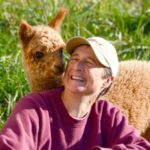 Jill Beebout runs Blue Gate Farm with her husband, Sean Skeehan. They steward 40 acres of family land in southern Marion County, Iowa, where they raise Certified Naturally Grown produce, hay and alpacas, marketing through CSA and VegEmail custom sales.
Jill Beebout runs Blue Gate Farm with her husband, Sean Skeehan. They steward 40 acres of family land in southern Marion County, Iowa, where they raise Certified Naturally Grown produce, hay and alpacas, marketing through CSA and VegEmail custom sales.
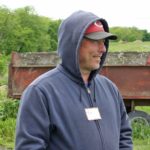 Rob Faux and his wife, Tammy Faux, operate Genuine Faux Farm, a CSA, produce and poultry operation near Tripoli, Iowa. Since launching the farm in 2005, Rob has been an inquisitive farmer, testing products and concepts on his own and through PFI’s Cooperators’ Program. Rob also works as an Iowa communications associate with the Pesticide Action Network.
Rob Faux and his wife, Tammy Faux, operate Genuine Faux Farm, a CSA, produce and poultry operation near Tripoli, Iowa. Since launching the farm in 2005, Rob has been an inquisitive farmer, testing products and concepts on his own and through PFI’s Cooperators’ Program. Rob also works as an Iowa communications associate with the Pesticide Action Network.
Meghan Filbert lives on a farm near LaFarge, Wisconsin, with her husband, Omar de Kok-Mercado, and son Owen. A passionate grazing advocate, Meghan works for NoFence, and previously worked at PFI as the livestock manager from 2014 to 2022.
 Christine Ross lives in Ankeny, Iowa, where she serves as the state refugee health coordinator for Iowa. In 1995, she immigrated to the U.S. as a refugee from South Sudan, initially settling in Omaha. There, she obtained a master’s degree in public health and in 2013 founded the Refugee Women Organization of Nebraska. Since 2018, RWON has partnered with Omaha Home for Boys, which provides garden space for RWON’s New American Urban Farmers Program. The initiative helps participants grow culturally important foods often unavailable locally while offering training in sustainable urban farming. RWON also supports the refugee community, with a focus on elderly women who engage in gardening as a means of sustenance and as a way to socialize and continue the activities they have cherished throughout their lives.
Christine Ross lives in Ankeny, Iowa, where she serves as the state refugee health coordinator for Iowa. In 1995, she immigrated to the U.S. as a refugee from South Sudan, initially settling in Omaha. There, she obtained a master’s degree in public health and in 2013 founded the Refugee Women Organization of Nebraska. Since 2018, RWON has partnered with Omaha Home for Boys, which provides garden space for RWON’s New American Urban Farmers Program. The initiative helps participants grow culturally important foods often unavailable locally while offering training in sustainable urban farming. RWON also supports the refugee community, with a focus on elderly women who engage in gardening as a means of sustenance and as a way to socialize and continue the activities they have cherished throughout their lives.
Keynote Address
Farmers of Forty Centuries: Reconciling Agriculture & Ecology
Eric Lee-Mäder
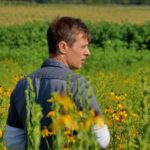 Eric Lee-Mäder is a co-founder and principal at Northwest Meadowscapes, a prairie seed company based in Washington state. His 25-year career in conservation includes prior work as a director at Xerces Society, where he led multinational pollinator conservation initiatives with major food companies and partnerships with farmers and the U.S. Department of Agriculture. Eric continues to advise food companies on integrating conservation into their supply chains, and his recent book, “The Milkweed Lands,” was awarded the 2023 National Outdoor Book Award.
Eric Lee-Mäder is a co-founder and principal at Northwest Meadowscapes, a prairie seed company based in Washington state. His 25-year career in conservation includes prior work as a director at Xerces Society, where he led multinational pollinator conservation initiatives with major food companies and partnerships with farmers and the U.S. Department of Agriculture. Eric continues to advise food companies on integrating conservation into their supply chains, and his recent book, “The Milkweed Lands,” was awarded the 2023 National Outdoor Book Award.
Saturday, 8:30-9:30 a.m. | Ballroom B
Prairie or farm? For most of the past two centuries, we’ve understood these as two very different types of rural landscapes – one tame, one wild, both standing in opposition to the other. But what if we’ve got the story all wrong? Iowa’s contemporary agriculture is, of course, built upon ancient wealth stored within prairie soils. Maybe that prairie legacy is also the key to our agricultural future. In this keynote conversation, farmer and ecologist Eric Lee-Mäder will highlight success stories of conservation farming that sometimes blur the lines between nature and agriculture, and which provide us with clues to what a multi-century vision of Iowa farming could look like.
Saturday Session 1: 10-11 a.m.
Q&A With Conference Keynoter Eric Lee Mader
Eric Lee-Mäder
 Eric Lee-Mäder is a cofounder and principal at Northwest Meadowscapes, a prairie seed company based in Washington state. His 25-year career in conservation includes prior work as a director at Xerces Society, where he led multinational pollinator conservation initiatives with major food companies and partnerships with farmers and the U.S. Department of Agriculture. Eric continues to advise food companies on integrating conservation into their supply chains, and his recent book, “The Milkweed Lands,” was awarded the 2023 National Outdoor Book Award.
Eric Lee-Mäder is a cofounder and principal at Northwest Meadowscapes, a prairie seed company based in Washington state. His 25-year career in conservation includes prior work as a director at Xerces Society, where he led multinational pollinator conservation initiatives with major food companies and partnerships with farmers and the U.S. Department of Agriculture. Eric continues to advise food companies on integrating conservation into their supply chains, and his recent book, “The Milkweed Lands,” was awarded the 2023 National Outdoor Book Award.
This session follows Eric Lee Mader’s keynote, “Farmers of Forty Centuries: Reconciling Agriculture & Ecology.” Bring your questions for a robust dialogue.
Funding Farm Growth Through Grants
Beth Romer, Wren Almitra, Christa Hartsook
Beth Romer, Choose Iowa’s program director, grew up on her family’s century farm where she learned firsthand the value of hard work and respect for stewarding the land for future generations. She earned a bachelor’s degree in business marketing from Wayne State College and a master’s degree in business administration from ISU. Beth’s marketing and communications expertise align with promoting and supporting Iowa’s farmers and the foods they raise through the Choose Iowa program.
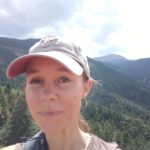 Wren Almitra is the grants advisor at the Michael Fields Agricultural Institute, a nonprofit organization addressing the challenges of soil fertility, water quality, climate resilience, racial equity, food security and farm success through research, policy and education. MFAI is based in East Troy, Wisconsin, and serves diverse farmers and communities in the Upper Midwest and beyond.
Wren Almitra is the grants advisor at the Michael Fields Agricultural Institute, a nonprofit organization addressing the challenges of soil fertility, water quality, climate resilience, racial equity, food security and farm success through research, policy and education. MFAI is based in East Troy, Wisconsin, and serves diverse farmers and communities in the Upper Midwest and beyond.
Christa Hartsook is the small farms program manager at the Food and Enterprise Development Center at ISU Extension and Outreach and Heartland Regional Food Business Center. She helps connect people to resources at the Iowa Department of Agriculture and Land Stewardship, the Iowa Department of Natural Resources, the Natural Resources Conservation Service and USDA. Christa’s team works with farm businesses looking to scale into food businesses.
Curious about what grants could help you grow your farm? Listen as a panel of service providers from a range of organizations – including Choose Iowa grants, the Heartland Regional Food Business grants, SARE Farmer Rancher grants and grant-advising services from the Michael Fields Agricultural Institute – talk grants, grant support and answer your pressing questions about growing your farm through grants.
Exploring Effects of Humic Products on Corn and Soybean Yields
Dana Dinnes, Dan Olk
 Dana Dinnes, an agronomist with USDA-ARS, has investigated topics like nitrogen fertilizer management and the effects of humic products on crop production. Dana has worked with research partner Dan Olk since 2010. Together, they have been evaluating how humic products affect row crop systems.
Dana Dinnes, an agronomist with USDA-ARS, has investigated topics like nitrogen fertilizer management and the effects of humic products on crop production. Dana has worked with research partner Dan Olk since 2010. Together, they have been evaluating how humic products affect row crop systems.
 Dan Olk is a research soil scientist and soil biochemist at the USDA Agricultural Research Service who has been researching the effects of humic products on corn and soybean yields for over a decade. Dan and research partner Dana Dinnes have been looking at the impacts of humic products on crop growth and soil properties. Dan also studies the biochemical composition of soil organic matter.
Dan Olk is a research soil scientist and soil biochemist at the USDA Agricultural Research Service who has been researching the effects of humic products on corn and soybean yields for over a decade. Dan and research partner Dana Dinnes have been looking at the impacts of humic products on crop growth and soil properties. Dan also studies the biochemical composition of soil organic matter.
Humic products have been gaining popularity among farmers for their potential to improve crop growth, yield and resistance to stressors. Most commonly derived from young coals, these products contain naturally occurring organic compounds that are concentrated in lignin-rich source materials. This session will explore over a decade of research by scientists at the USDA’s Agricultural Research Service in Ames, Iowa. Their research has explored how these products – which are applied either to the soil at planting or to crop leaves – work in row crop systems. The USDA-ARS results, similar to results from elsewhere, suggest humic products have biostimulant effects on the crops they’re applied to. Learn in this session how these products can impact corn and soybean yields.
Successfully Planting Corn Into Living Alfalfa in an Organic Rotation
Ben Miller, Brian Magarin
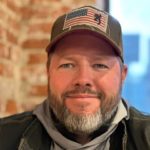 Ben Miller grows organic corn, soybeans, wheat and alfalfa near Maxwell, Nebraska. He has been exploring various cover crop management strategies over the past 25 years and has been farming organically since 2005. As asset manager with Clear Frontier Ag Management, Ben works with growers as they transition to organic and regenerative practices.
Ben Miller grows organic corn, soybeans, wheat and alfalfa near Maxwell, Nebraska. He has been exploring various cover crop management strategies over the past 25 years and has been farming organically since 2005. As asset manager with Clear Frontier Ag Management, Ben works with growers as they transition to organic and regenerative practices.
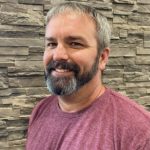 Brian Magarin operates and manages organic farms near Holstein, Nebraska, where he grows corn, soybeans, wheat, rye and alfalfa. He started exploring organic no-till in 2018 and has seen success by using roller-crimping and flaming equipment. Brian enjoys sharing with and learning from his peers new ways of moving organic and conventional agriculture toward a regenerative focus.
Brian Magarin operates and manages organic farms near Holstein, Nebraska, where he grows corn, soybeans, wheat, rye and alfalfa. He started exploring organic no-till in 2018 and has seen success by using roller-crimping and flaming equipment. Brian enjoys sharing with and learning from his peers new ways of moving organic and conventional agriculture toward a regenerative focus.
Alfalfa holds many benefits for a rotation, including reducing weed pressure and fixing nitrogen for a following corn crop. Brian Magarin and Ben Miller have found success strip-tilling corn and no-tilling it into living alfalfa on their irrigated organic farms in south-central Nebraska. Come hear both Brian and Ben’s paths to success with this practice and the management tips they’ve learned along the way.
Why It Matters: The Ripple Effect of Local Conservation on Regional and National Efforts
Seth Watkins
Seth Watkins runs Pinhook Farm, his family’s heritage farm near Clarinda, Iowa. Seth raises corn, soybeans, winter wheat and alfalfa along with a cow-calf herd. Seth has implemented a variety of conservation practices like cover crops, no-till, integrating livestock into crop fields, prairies strips and more. He’s also transitioned many acres out of production entirely, transforming those spaces into valuable habitat.
Small-scale conservation efforts on individual farms aren’t just a drop in the bucket – they can influence large-scale efforts on a regional basis and have a cumulative effect on your town, county, state and country. Join Seth Watkins of Pinhook Farm as he discusses his role in creating and restoring terrestrial and riparian habitat on farms here in Iowa, and how doing so impacts the conservation efforts undertaken in the U.S. Gulf region.
CYA (Cover Your Acres) With Cover Crops for Vegetable Farms
Jennie Erwin
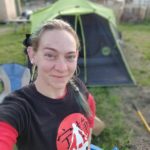 Jennie Erwin owns and operates Daystar Harvest, a sustainable farm near Boone, Iowa, where she grows vegetables and herbs. She is also a mom and engineer, and works as the farm management specialist with Global Greens, the Lutheran Services in Iowa farm program in Des Moines that connects former refugee farmers with land to grow food and start farm businesses.
Jennie Erwin owns and operates Daystar Harvest, a sustainable farm near Boone, Iowa, where she grows vegetables and herbs. She is also a mom and engineer, and works as the farm management specialist with Global Greens, the Lutheran Services in Iowa farm program in Des Moines that connects former refugee farmers with land to grow food and start farm businesses.
When it comes to using cover crops in vegetable production, Jennie Erwin has been around the block. From testing whether sunflower biochemicals can help manage Canada thistle, to throwing down some buckwheat seeds in naked beds as a placeholder, to using peas to increase fertility, Jennie has tried enough techniques – and had enough wins – to have tips, schedules and recipes to share. Whether you’re new, experienced or just curious, come with your questions and experiences about how cover crops can cover your acres.
Using the Lean System To Earn a Comfortable Living on a Farm
Ben Hartman
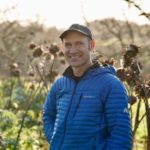 Ben Hartman is the author of “The Lean Farm,” a 2016 winner of the Shingo Institute’s Prestigious Research and Professional Publication Award. He and his wife, Rachel Hershberger, own Clay Bottom Farm in Goshen, Indiana, where they make their living on less than 1 acre growing and selling specialty produce to restaurants and at a farmers market. Ben was appointed to the 2017 Grist 50, a list of emerging green leaders in the United States.
Ben Hartman is the author of “The Lean Farm,” a 2016 winner of the Shingo Institute’s Prestigious Research and Professional Publication Award. He and his wife, Rachel Hershberger, own Clay Bottom Farm in Goshen, Indiana, where they make their living on less than 1 acre growing and selling specialty produce to restaurants and at a farmers market. Ben was appointed to the 2017 Grist 50, a list of emerging green leaders in the United States.
In this session, Ben Hartman, author of “The Lean Farm,” will explain concepts from the lean system he and his wife Rachel use to earn a comfortable living on one-third acre of land at Clay Bottom Farm, which they own and operate in Goshen, Indiana. Ben will offer concrete tips that farms of any size and type can start applying right away. Lean is a production system that originated in Japanese manufacturing and is now widely used in all types of industries. Specific topics Ben will cover include using the lean model’s 5S approach to organize a farm; how to precisely identify value; the seven mudas (wastes) and tools to banish waste; and kaizen (continuous improvement).
Grazing for the Birds
Ashly Steinke, Krysten Zummo
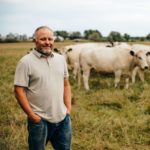 Ashly Steinke is a grass-based beef farmer in Cornell, Wisconsin. He is also a grassland ecologist overseeing the new Audubon Conservation Ranching program in Wisconsin. In this role, Ashly helps farmers and ranchers enroll, develop habitat management plans and meet program requirements so they can attain bird-friendly certification through Audubon, which they can use for marketing. Ashly is implementing ACR protocols on his farm, and has over 15 years of experience as an ecologist restoring wetland and grassland habitat.
Ashly Steinke is a grass-based beef farmer in Cornell, Wisconsin. He is also a grassland ecologist overseeing the new Audubon Conservation Ranching program in Wisconsin. In this role, Ashly helps farmers and ranchers enroll, develop habitat management plans and meet program requirements so they can attain bird-friendly certification through Audubon, which they can use for marketing. Ashly is implementing ACR protocols on his farm, and has over 15 years of experience as an ecologist restoring wetland and grassland habitat.
 Krysten Zummo is an avid birder based in La Crosse, Wisconsin, with bachelor’s and master’s degrees in wildlife science and management. Since 2008, she has focused her schooling and career on understanding the impacts of habitat management on bird populations. For the past seven years, Krysten has used her knowledge to help landowners make management decisions and add conservation practices to improve habitat for birds and other wildlife. Since 2023, she has been working with farmers and ranchers in Minnesota as a grassland ecologist for Audubon.
Krysten Zummo is an avid birder based in La Crosse, Wisconsin, with bachelor’s and master’s degrees in wildlife science and management. Since 2008, she has focused her schooling and career on understanding the impacts of habitat management on bird populations. For the past seven years, Krysten has used her knowledge to help landowners make management decisions and add conservation practices to improve habitat for birds and other wildlife. Since 2023, she has been working with farmers and ranchers in Minnesota as a grassland ecologist for Audubon.
Grassland bird populations in North America have declined by more than 50% in the last 50 years, one of the steepest drops of any bird community. Most of these birds inhabit privately owned land, presenting both challenges and opportunities. The Audubon Conservation Ranching program aims to reverse this trend by working with graziers to add or enhance habitat on working lands through a new certification program. In this session, Ashly Steinke will share how following ACR protocols on his Wisconsin farm has increased birds, the health of his herd and his overall profitability. Krysten Zummo, Audubon grassland ecologist, will share ACR basics and new program details for Iowa.
Roundtable: Partnering With Neighbors To Do More
Hannah Bernhardt
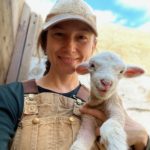 Hannah Bernhardt and her husband, Jason Misik, tend the 160 acres of Medicine Creek Farm, their farm in northeastern Minnesota. Their regenerative family farm sells 100% grass-fed lamb and beef, organically fed pastured pork and livestock guardian dog puppies.
Hannah Bernhardt and her husband, Jason Misik, tend the 160 acres of Medicine Creek Farm, their farm in northeastern Minnesota. Their regenerative family farm sells 100% grass-fed lamb and beef, organically fed pastured pork and livestock guardian dog puppies.
Not everyone can do everything. Often, it makes sense to partner with neighbors to fill gaps or boost supply. But while those relationships can come with unique opportunities, they can also present challenges. Join this roundtable discussion, moderated by Hannah Bernhardt, to share what you’re curious about or succeeding with in the world of joint marketing, sharing freezer space or equipment, or other unique collaborations!
Conozca a su enemigo: cómo funcionan las malezas y las herramientas para controlarlas
Sam Oschwald Tilton
 Sam Oschwald Tilton dirige Glacial Drift Enterprises, donde asesora a agricultores, empresas y organizaciones para mejorar el manejo de malezas, redactar planes agrícolas y ofrecer programas educativos atractivos. Sam ha trabajado en muchos puestos en las granjas de hortalizas y sus alrededores: como peón, dirigiendo su propio CSA y gestionando una granja educativa. También trabajó en toda Europa y EE. UU. como representante de ventas para las herramientas de deshierbe KULT-Kress; fue instructor de manejo sostenible del paisaje en Lakeshore Technical College; y se desempeñó como especialista en vegetales de mercado directo para la Extensión de la Universidad de Wisconsin-Madison. Durante los últimos seis años, Sam ha organizado el Día de Campo de Control Mecánico de Malezas del Medio Oeste. Ahora vive en Minneapolis y disfruta compartiendo su amor por las plantas con los niños de su comunidad.
Sam Oschwald Tilton dirige Glacial Drift Enterprises, donde asesora a agricultores, empresas y organizaciones para mejorar el manejo de malezas, redactar planes agrícolas y ofrecer programas educativos atractivos. Sam ha trabajado en muchos puestos en las granjas de hortalizas y sus alrededores: como peón, dirigiendo su propio CSA y gestionando una granja educativa. También trabajó en toda Europa y EE. UU. como representante de ventas para las herramientas de deshierbe KULT-Kress; fue instructor de manejo sostenible del paisaje en Lakeshore Technical College; y se desempeñó como especialista en vegetales de mercado directo para la Extensión de la Universidad de Wisconsin-Madison. Durante los últimos seis años, Sam ha organizado el Día de Campo de Control Mecánico de Malezas del Medio Oeste. Ahora vive en Minneapolis y disfruta compartiendo su amor por las plantas con los niños de su comunidad.
Únase al orador, Sam Oschwald Tilton, para aprender sobre las estrategias basadas en sistemas para el control de malezas, las herramientas e implementos individuales y las estrategias de mejor uso para su equipo actual. Por lo general, las mismas 1 a 3 especies de malezas causan problemas en las granjas. Para un control eficaz de las malas hierbas, los agricultores deben entender cómo funcionan las malas hierbas: cada especie de hierba tiene una personalidad o estilo de vida diferente. Cuando hayas identificado tu problema de maleza, puedes aprender sobre su personalidad y usar ese conocimiento para controlarla. Las herramientas de deshierbe son solo una parte del panorama del control de malezas. Esta sesión presentará las personalidades de las malas hierbas y cómo conocer a tu enemigo puede ayudar a controlarlo. Luego hablaremos sobre las herramientas de deshierbe y cómo usarlas.
Saturday Session 2: 1:45-2:45 p.m.
First-Time Grant Writing for Beginning Farmers
Carly Zierke
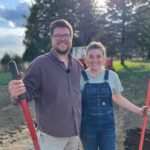 Carly Zierke, co-owner of Sweet Season Farm, grows certified organic vegetables in Calmar, Iowa, serving the Decorah area. She and her partner, Ethan Zierke, use regenerative practices that improve the health of the land. Sweet Season Farm’s mission is to preserve Iowa’s rich topsoil while contributing to a resilient local food system.
Carly Zierke, co-owner of Sweet Season Farm, grows certified organic vegetables in Calmar, Iowa, serving the Decorah area. She and her partner, Ethan Zierke, use regenerative practices that improve the health of the land. Sweet Season Farm’s mission is to preserve Iowa’s rich topsoil while contributing to a resilient local food system.
Thinking of applying for your first grant? Join Carly Zierke, co-owner and operator of Sweet Season Farm, as she walks us through her grant search and grant writing process. She’ll also offer tips for beginning farmers applying for their first grant.
Diversifying Income Through Value-Added Grain Infrastructure
John and Halee Wepking
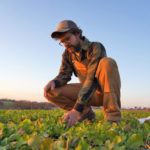 John and Halee Wepking own Meadowlark Organics & Meadowlark Community Mill in Ridgeway, Wisconsin. They manage 1,000 acres of diversified field crops and cattle and operate a stone mill sourcing grain from farmers to be processed and distributed regionally. John and Halee work to create direct grain markets, helping farmers maximize profitability and keep their grains within the foodshed.
John and Halee Wepking own Meadowlark Organics & Meadowlark Community Mill in Ridgeway, Wisconsin. They manage 1,000 acres of diversified field crops and cattle and operate a stone mill sourcing grain from farmers to be processed and distributed regionally. John and Halee work to create direct grain markets, helping farmers maximize profitability and keep their grains within the foodshed.
Grain farms are often reliant upon concentrated income generated on a seasonal basis, while expenses remain constant year-round. Value-added solutions can diversify income streams and increase the resilience of an operation, and can be as focused as a seed-cleaning enterprise or as robust as a full-service flour mill. John and Halee Wepking of Meadowlark Farm and Mill will share what they’ve learned on their journey to becoming a vertically integrated diversified grain farm.
Panel: Trial Results: Soybean Maturity and Cover Crop Termination
Tracy Skaar, Landon Brown, Jeremy Gustafson
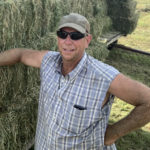 Tracy Skaar grows corn, soybeans, oats and hay with his son, Mic, on a combined 850 acres in Hayward, Minnesota. Half of their beans are no-tilled with a cereal rye cover crop, and their oats are underseeded with a mix of red clover and non-dormant alfalfa or alfalfa for a hay crop. Last year, Tracy was involved in a PFI Cooperators’ Program trial testing termination dates after planting soybeans into green rye cover crops.
Tracy Skaar grows corn, soybeans, oats and hay with his son, Mic, on a combined 850 acres in Hayward, Minnesota. Half of their beans are no-tilled with a cereal rye cover crop, and their oats are underseeded with a mix of red clover and non-dormant alfalfa or alfalfa for a hay crop. Last year, Tracy was involved in a PFI Cooperators’ Program trial testing termination dates after planting soybeans into green rye cover crops.
 Landon Brown raises corn and soybeans, along with relay-cropping soybeans, rye and oats, near New Providence, Iowa. He uses no-till and cover crops on all his acres to help reduce erosion and reliance on chemical control. Landon has taken part in various PFI research trials related to cover crop management practices in the past three years.
Landon Brown raises corn and soybeans, along with relay-cropping soybeans, rye and oats, near New Providence, Iowa. He uses no-till and cover crops on all his acres to help reduce erosion and reliance on chemical control. Landon has taken part in various PFI research trials related to cover crop management practices in the past three years.
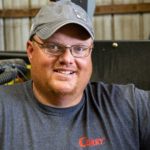 Jeremy Gustafson is a lifetime member of PFI who farms just outside of Boone, Iowa, raising corn and soybeans and cover cropping extensively with cereal rye. He also works through PFI’s Cooperators’ Program to complete on-farm research projects. Last year, he completed a trial testing termination dates after planting soybeans into green rye cover crops.
Jeremy Gustafson is a lifetime member of PFI who farms just outside of Boone, Iowa, raising corn and soybeans and cover cropping extensively with cereal rye. He also works through PFI’s Cooperators’ Program to complete on-farm research projects. Last year, he completed a trial testing termination dates after planting soybeans into green rye cover crops.
In this session, you’ll hear from three farmers who took part in a PFI on-farm research project comparing cover crop termination near soybean planting to a delayed termination after planting for later-maturing soybean varieties. Delaying termination may allow for more cover crop growth and subsequent weed suppression, but it can cause a yield decrease in soybeans. Hear what Tracy, Landon and Jeremy found on their farms and ask questions about their trial experiences.
From Farm to Future: Protecting Iowa’s Agricultural Heritage
Joe Klingelhutz, Breanna Horsey
 Joe Klingelhutz worked as the full-time farm specialist for SILT between 2018-2022. He is currently working part-time for SILT, and for PFI as a land access navigator. Joe lives in Iowa City, Iowa, where he is involved with farming organic vegetables, honeybees and perennials. He runs his own independent beekeeping operation and has worked for several other farms.
Joe Klingelhutz worked as the full-time farm specialist for SILT between 2018-2022. He is currently working part-time for SILT, and for PFI as a land access navigator. Joe lives in Iowa City, Iowa, where he is involved with farming organic vegetables, honeybees and perennials. He runs his own independent beekeeping operation and has worked for several other farms.
 Breanna Horsey serves as the executive director of SILT. She brings a wealth of experience to her role. Breanna has a bachelor’s degree in environmental studies and a master’s degree in organizational development. Previously, she worked to promote sustainable practices and improve water quality as an urban conservationist in western Iowa. She is passionate about connecting farmers, landowners and conservationists to create a more sustainable and resilient Iowa.
Breanna Horsey serves as the executive director of SILT. She brings a wealth of experience to her role. Breanna has a bachelor’s degree in environmental studies and a master’s degree in organizational development. Previously, she worked to promote sustainable practices and improve water quality as an urban conservationist in western Iowa. She is passionate about connecting farmers, landowners and conservationists to create a more sustainable and resilient Iowa.
Are you a landowner or farmer in Iowa thinking about the future of your farmland? Join staff of the Sustainable Iowa Land Trust as they delve into why it’s so important to preserve Iowa farmland for growing table food. Learn about innovative strategies SILT uses, such as conservation easements, to ensure the longevity and productivity of Iowa’s farmland for future generations. This session will also provide space for you to discuss affordable opportunities for protecting Iowa’s agricultural legacy.
“Lean” Ideas Applied to the Market Garden
Ben Hartman
 Ben Hartman is the author of “The Lean Farm,” a 2016 winner of the Shingo Institute’s Prestigious Research and Professional Publication Award. He and his wife, Rachel Hershberger, own Clay Bottom Farm in Goshen, Indiana, where they make their living on less than 1 acre growing and selling specialty produce to restaurants and at a farmers market. Ben was appointed to the 2017 Grist 50, a list of emerging green leaders in the United States.
Ben Hartman is the author of “The Lean Farm,” a 2016 winner of the Shingo Institute’s Prestigious Research and Professional Publication Award. He and his wife, Rachel Hershberger, own Clay Bottom Farm in Goshen, Indiana, where they make their living on less than 1 acre growing and selling specialty produce to restaurants and at a farmers market. Ben was appointed to the 2017 Grist 50, a list of emerging green leaders in the United States.
In this workshop geared toward market growers, Ben will show the growing systems he uses at Clay Bottom Farm, based on the lean business model, to earn a living working 35 hours or less per week using less than one-third acre of land. All of the farm’s food sells within 1.5 miles of the farm. Ben will guide you through concrete examples of “lean” thinking, which aims to eliminate different forms of waste to make farms more profitable. Examples include using lean ideas to grow tomatoes, greens, kale, cilantro, basil and more; build soil and prepare no-till beds; make compost; and transplant with paper pots.
Do Farm Naked: Molding Yoga Into a Farming Life
Kyle Maxwell
 Kyle Maxwell farms alongside his partner, Kate Solko, at Root to Rise Farm near Ames, Iowa. He is also a certified yoga instructor.
Kyle Maxwell farms alongside his partner, Kate Solko, at Root to Rise Farm near Ames, Iowa. He is also a certified yoga instructor.
Do you ever find yourself basking in a 70-degree high tunnel in the depths of winter and have the urge to strip down and enjoy the warmth? That would be a great time to practice yoga! The physical labor involved in vegetable farming means those farmers use their bodies like athletes, and ideally, they train like it. In this session, farmer and yoga instructor Kyle Maxwell will describe his practical approach to yoga; introduce some poses and practices to address farmer-specific aches; and reveal ways to fit regular practice into a busy farming life in conventional – and unconventional – ways.
Grazing Resilience With Warm-Season Perennials
Gene Schriefer
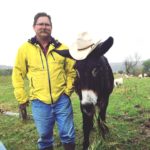 Gene Schriefer and his wife, Ruth Schriefer, operate a grass-finished beef operation in southwest Wisconsin and raise a flock of grazing sheep. Gene is currently the state executive director of the USDA Farm Service Agency in Wisconsin, but previously worked as a grazing specialist and University of Wisconsin-Madison Extension agricultural educator. Gene’s interests and concerns are rural poverty, depopulation in agriculturally dependent regions, loss of community, environmental degradation and loss of resilience in the face of climate change.
Gene Schriefer and his wife, Ruth Schriefer, operate a grass-finished beef operation in southwest Wisconsin and raise a flock of grazing sheep. Gene is currently the state executive director of the USDA Farm Service Agency in Wisconsin, but previously worked as a grazing specialist and University of Wisconsin-Madison Extension agricultural educator. Gene’s interests and concerns are rural poverty, depopulation in agriculturally dependent regions, loss of community, environmental degradation and loss of resilience in the face of climate change.
As drought, floods and other extreme weather continues to be more common, it’s important that your farm has the resiliency to adapt. Join Gene as he shares the experiments he has done on his own farm to incorporate warm-season native perennials. He’ll explain the benefits he’s seen from his stand of pure big bluestem, as well as the difficulties it poses, and how these plants fit into the larger context of his farm.
The Ins and Outs of Pasture Farrowing
John Gilbert
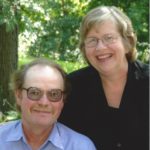 John Gilbert farms with his family near South Fork, a tributary of the Iowa River, raising pigs, dairy beef, row crops, small grains and forages. The farm includes John and Beverly; their eldest son John, his wife Sarah and their daughters; as well as John’s brother, Greg, and his wife Barb. Conservation has been an integral part of the farm since John and Greg’s father returned from naval service in WWII. Keeping livestock on the land has been a foundation of the farm that today also includes no till, cover crops, tailored rotations, waterways, terraces, rotational grazing, grassed headlands and a significant riparian habitat. The farm, Gibralter Farms Ltd, has been recognized for its work toward sustainability by both PFI and Niman Ranch.
John Gilbert farms with his family near South Fork, a tributary of the Iowa River, raising pigs, dairy beef, row crops, small grains and forages. The farm includes John and Beverly; their eldest son John, his wife Sarah and their daughters; as well as John’s brother, Greg, and his wife Barb. Conservation has been an integral part of the farm since John and Greg’s father returned from naval service in WWII. Keeping livestock on the land has been a foundation of the farm that today also includes no till, cover crops, tailored rotations, waterways, terraces, rotational grazing, grassed headlands and a significant riparian habitat. The farm, Gibralter Farms Ltd, has been recognized for its work toward sustainability by both PFI and Niman Ranch.
In a talk that promises to complete the circle, Iowa Falls-area farmer John Gilbert discusses the pasture farrowing system his family has used for more than 30 years. John first learned about the system during a talk by Dick Snyder, of Cambridge, Iowa, at one of PFI’s early annual gatherings. The huts the Gilberts are Dick’s design, and are built to be used for spring and fall farrowing, allowing two litters per year from the same sows. The talk will explain how the Gilberts’ system has let them raise and sell their pigs to Niman Ranch for more than 26 years.
Tips and Tricks for Breeding and Brooding Chickens
Dave Brown
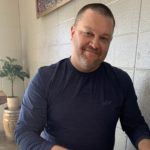 Dave Brown lives on a small homestead near Kansas City, Missouri, with his wife, Trish, and two German shorthaired pointers. He breeds silver- and gold-laced Wyandottes and cotton patch geese, which keep him busy along with a large garden and beekeeping. In his spare time, Dave enjoys hiking, fishing, brewing and woodworking.
Dave Brown lives on a small homestead near Kansas City, Missouri, with his wife, Trish, and two German shorthaired pointers. He breeds silver- and gold-laced Wyandottes and cotton patch geese, which keep him busy along with a large garden and beekeeping. In his spare time, Dave enjoys hiking, fishing, brewing and woodworking.
If you’re breeding or brooding chickens, you can look up plenty of information online. But to get the tips and tricks to make your chores, breeding and husbandry faster and cheaper all in one place, you have to come hear Dave. From deep-litter methods for brooders and fixed coops to the unique needs of chicken tractors in breeding flocks, Dave will share some of his accumulated knowledge as one of the premier laced Wyandotte breeders in the country.
Establecimiento de objetivos holísticos
Lucia Schulz
 Lucia Schulz es asociada de organización comunitaria para el Programa Agrícola y Comunitario del Centro de Asuntos Rurales. Su trabajo se centra en alentar a los agricultores latinos a establecer contactos, educar y liderar.
Lucia Schulz es asociada de organización comunitaria para el Programa Agrícola y Comunitario del Centro de Asuntos Rurales. Su trabajo se centra en alentar a los agricultores latinos a establecer contactos, educar y liderar.
Únase a nosotros para una sesión interactiva de una hora sobre el establecimiento de objetivos holísticos y cómo comenzar con la agricultura. Identificarás tu “por qué” en relación con la agricultura y tendrás tiempo para reflexionar sobre qué estilo de vida agrícola se adapta a ti. Esta sesión será conducida por Lucia Shulz, organizadora comunitaria asociada del Centro de Asuntos Rurales. Lucía ha estado trabajando con agricultores y ganaderos latinos durante los últimos siete años en Nebraska y Iowa.
Saturday Session 3: 3:15-4:15 p.m.
What To Know Before You Hire Your First Employee
Kristy and Bob Walker
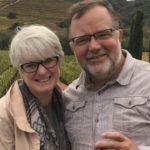 Kristy and Bob Walker founded Walker Homestead Farm and Winery near Iowa City, Iowa, in 2018, creating a diverse and sustainable operation that includes gardens, orchards, vineyards, pasture and cropland. The farm also features a small venue, offering a unique combination of farming and agritourism. Over the years, Kristy and Bob have grown their workforce to an average of 28 employees, including 10 full-time staff members, reflecting their commitment to providing quality, year-round jobs. Kristy and Bob are passionate about fostering a supportive work environment that emphasizes sustainable farming practices and creates meaningful employment opportunities within their community.
Kristy and Bob Walker founded Walker Homestead Farm and Winery near Iowa City, Iowa, in 2018, creating a diverse and sustainable operation that includes gardens, orchards, vineyards, pasture and cropland. The farm also features a small venue, offering a unique combination of farming and agritourism. Over the years, Kristy and Bob have grown their workforce to an average of 28 employees, including 10 full-time staff members, reflecting their commitment to providing quality, year-round jobs. Kristy and Bob are passionate about fostering a supportive work environment that emphasizes sustainable farming practices and creates meaningful employment opportunities within their community.
Are you considering hiring your first employee but feeling unsure about where to begin? Join Kristy and Bob Walker, co-owners of Walker Homestead Farm and Winery, for a comprehensive session that will guide small agricultural businesses and farms through the essential steps of building and sustaining a workforce. Drawing on their own experiences, Kristy and Bob will walk you through their steps at startup and their transition from part-time, seasonal help to full-time, year-round employees, highlighting key factors such as financial readiness, payroll setup, tax compliance and labor law obligations. They’ll also address operational essentials like defining clear roles, and ensuring a cultural fit.
Interseeding Cover Crops for Organic Nutrient Management, Soil Health and Weed Control
Rye Carlson
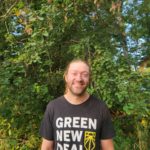 Rye Carlson owns and operates Fresh Starts Farm in Mora, Minnesota, where he grows organic soybeans, corn and sunflowers, all interseeded with cover crops. At Fresh Starts Farm, Rye mills all the farm’s grain into certified organic feed for poultry, hogs and dairy animals. He also uses cover crops to suppress weeds, cycle nutrients and improve soil health.
Rye Carlson owns and operates Fresh Starts Farm in Mora, Minnesota, where he grows organic soybeans, corn and sunflowers, all interseeded with cover crops. At Fresh Starts Farm, Rye mills all the farm’s grain into certified organic feed for poultry, hogs and dairy animals. He also uses cover crops to suppress weeds, cycle nutrients and improve soil health.
Cover crops offer a host of benefits when seeded between crop rows on an organic grain farm. Sown early and designed to mature quickly, interseeding a companion cover crop reduces weed pressure, promotes soil microbial activity and builds soil while also offering nutrient sequestration and release later in the season. Hear from Rye Carlson about Fresh Starts Farm’s methods, including inter-row crimping for managing buckwheat, phacelia, mustard, peas and oats as companion cover crops to corn, soybeans and sunflowers.
Panel: Trial Results: Can We Reduce N Rates to Corn and Improve ROI?
Sean Dengler, Nathan Anderson, Ross McCaw
 Sean Dengler farms with his dad, raising corn and soybeans on his family’s land between Traer and Dysart, Iowa. Sean has participated in PFI’s Cooperators’ Program, completing on-farm research trials to hone nitrogen rates on the family farm.
Sean Dengler farms with his dad, raising corn and soybeans on his family’s land between Traer and Dysart, Iowa. Sean has participated in PFI’s Cooperators’ Program, completing on-farm research trials to hone nitrogen rates on the family farm.
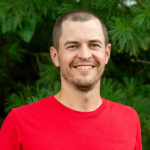 Nathan Anderson owns and operates Bobolink Prairie Farms near Aurelia, Iowa, raising corn, soybeans, cattle, small grains and hay. Nathan and his family have worked to grow their cattle herd while improving grazing management and incorporating cover crops through on-farm research. Nathan is a lifetime member of PFI. He is also a former board president and current board member for the northwest region.
Nathan Anderson owns and operates Bobolink Prairie Farms near Aurelia, Iowa, raising corn, soybeans, cattle, small grains and hay. Nathan and his family have worked to grow their cattle herd while improving grazing management and incorporating cover crops through on-farm research. Nathan is a lifetime member of PFI. He is also a former board president and current board member for the northwest region.
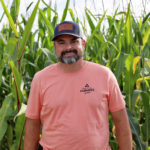 Ross McCaw farms near Marengo, Iowa, where he owns and operates McCaw Custom Farms. He specializes in corn, soybeans and cereal rye, and has been planting cover crops since 2019 as a way to reduce his nitrogen inputs. In 2024, he strove to bring his nitrogen levels below 100 pounds per acre, down from 120 pounds per acre in 2023.
Ross McCaw farms near Marengo, Iowa, where he owns and operates McCaw Custom Farms. He specializes in corn, soybeans and cereal rye, and has been planting cover crops since 2019 as a way to reduce his nitrogen inputs. In 2024, he strove to bring his nitrogen levels below 100 pounds per acre, down from 120 pounds per acre in 2023.
In 2023, 19 farmers carried out 22 replicated strip trials testing their typical nitrogen rate against that rate reduced by an amount of their choosing. In this session, three farmers will share a synopsis of their trial results, and the audience will have a chance to ask them questions about their results and participation in the trial.
Roundtable: Conversation Starters for Landowners and Tenants
Mollie Aronowitz
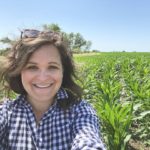 Mollie Aronowitz is a licensed realtor, accredited land manager and sustainability director with Peoples Company. Mollie manages and consults on farms across Iowa and oversees sustainability initiatives within Peoples Company, with a focus on in-field and edge-of-field conservation. She also advises landowners as part of PFI’s Landowner Coaching Program.
Mollie Aronowitz is a licensed realtor, accredited land manager and sustainability director with Peoples Company. Mollie manages and consults on farms across Iowa and oversees sustainability initiatives within Peoples Company, with a focus on in-field and edge-of-field conservation. She also advises landowners as part of PFI’s Landowner Coaching Program.
It’s not always easy to start a conversation with a landowner or tenant about adding conservation practices, but there are effective way to make these challenging discussions easier. Join Mollie Aronowitz as she shares proven methods for engaging in productive discussions that define and align the conservation goals of both landowner and tenant. Come ready to discuss your unique concerns about creating a conservation plan with your own tenant or landlord.
Climate Crops: Broccolini and Other Adaptations
Ana Timmer, T.D. Holub
 Ana Timmer has worked at The Cornucopia in Sioux Center, Iowa, for the last six years as the field team leader, and she staffs the Falls Park Farmers Market in Sioux Falls, South Dakota. Ana has a passion for agroecology and for teaching people about food through her conversations at the farmers market and through the CSA newsletter she writes.
Ana Timmer has worked at The Cornucopia in Sioux Center, Iowa, for the last six years as the field team leader, and she staffs the Falls Park Farmers Market in Sioux Falls, South Dakota. Ana has a passion for agroecology and for teaching people about food through her conversations at the farmers market and through the CSA newsletter she writes.
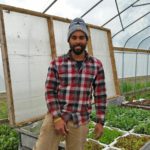 T.D. Holub owns and operates Garden Oasis Farm with his wife, Sarah Holub, near Coggon, Iowa. Their farm started in 2013 with a half-acre of vegetable production and has grown to 6 acres of outdoor production and five high tunnels. T.D. and Sarah provide all the farm labor, with just a few seasonal part-time staff, so efficiency improvements through mechanization and crop selection are continuous goals. Garden Oasis Farm markets through CSA, on-farm sales, grocery stores and restaurants.
T.D. Holub owns and operates Garden Oasis Farm with his wife, Sarah Holub, near Coggon, Iowa. Their farm started in 2013 with a half-acre of vegetable production and has grown to 6 acres of outdoor production and five high tunnels. T.D. and Sarah provide all the farm labor, with just a few seasonal part-time staff, so efficiency improvements through mechanization and crop selection are continuous goals. Garden Oasis Farm markets through CSA, on-farm sales, grocery stores and restaurants.
Growing conditions in Iowa’s climate have become harder to navigate, and some once-reliable crops don’t perform as consistently as they once did. At the same time, newer crops like broccolini have entered the field, filling production gaps in new but more reliable ways. Hear perspectives on growing broccolini, and other adaptations to vegetable farm crop lists, from two farmers based in opposite ends of the state – and share how your own crop list has evolved to stay productive and build resilience.
Elevating Herbs
Emma Barber
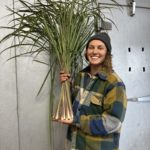 Emma Barber, owner of Rhubarb Botanicals, is a Midwest-based herbalist and farmer committed to growing vibrant botanicals for community health and well-being. A Minnesota native, she farms with partner Jeremy Wilhelm in Linn County, Iowa, where they raise medicinal and culinary herbs and fresh-cut flowers on 1 acre, alongside their newly established 32-acre pasture where they raise grass-fed lamb. The couple were part of PFI’s Savings Incentive Program Class of 2023.
Emma Barber, owner of Rhubarb Botanicals, is a Midwest-based herbalist and farmer committed to growing vibrant botanicals for community health and well-being. A Minnesota native, she farms with partner Jeremy Wilhelm in Linn County, Iowa, where they raise medicinal and culinary herbs and fresh-cut flowers on 1 acre, alongside their newly established 32-acre pasture where they raise grass-fed lamb. The couple were part of PFI’s Savings Incentive Program Class of 2023.
At Rhubarb Botanicals, herbalist and farmer Emma Barber has grown, harvested, researched and concocted a plethora of herbs and remedies. Emma will share what she’s learned navigating herbal product manufacturing compliance on both a state and federal level. She’ll also offer key points to consider when starting a value-added herbal business. Whether herb production on your farm is about capturing loss or about intentionally adding value, this session will build your knowledge and confidence to make herbs a viable and beneficial part of your farm.
Year-Round Grazing in the Midwest: Building a Forage Chain
Kevin Fulton
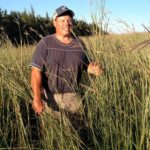 Kevin Fulton owns and operates Clear Creek Land & Livestock, a holistically managed organic farming and grazing operation in the Loess Hills of central Nebraska. The farm has hosted visitors from around the world and been featured in numerous publications, documentaries and videos. Kevin has held leadership positions in various farm organizations on state and national levels. He has also lectured at events from New York City to Los Angeles while educating consumers, farmers, advocacy groups and university faculty and students.
Kevin Fulton owns and operates Clear Creek Land & Livestock, a holistically managed organic farming and grazing operation in the Loess Hills of central Nebraska. The farm has hosted visitors from around the world and been featured in numerous publications, documentaries and videos. Kevin has held leadership positions in various farm organizations on state and national levels. He has also lectured at events from New York City to Los Angeles while educating consumers, farmers, advocacy groups and university faculty and students.
Despite what some people believe, grazing ruminant animals year-round in the Midwest is not only possible, it’s the most pragmatic approach for maximizing profits in your livestock operation. But it takes some planning to navigate through drought, summer slump and brutal winter weather. This session will present strategies for building a forage chain that will reduce feed and labor costs, keep your animals healthy and boost fertility across your farm.
When Is the Right Time To Castrate Goats?
Bee Lutz
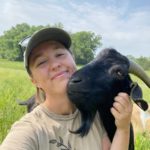 Bee Lutz has been a tenant goatherd to Kiko goats for seven years throughout Minnesota, Iowa and Wisconsin. Bee’s primary focus is targeted grazing for ecological resilience, along with raising high-quality meat goats. Bee is motivated by right relationship with land and supporting other emerging agrarians.
Bee Lutz has been a tenant goatherd to Kiko goats for seven years throughout Minnesota, Iowa and Wisconsin. Bee’s primary focus is targeted grazing for ecological resilience, along with raising high-quality meat goats. Bee is motivated by right relationship with land and supporting other emerging agrarians.
Castrating goat kids and lambs is a common practice, but there are no set regulations on this procedure in the U.S. Farmers commonly castrate animals anywhere from one or two days old to several months old. Come hear Bee share the results of a Cooperators’ Program on-farm research trial looking at whether the timing of kid or lamb castration affects the final hanging weights of the animals or general herd health.
Mantenimiento de registros 101
Francisco Díaz, Danny Carper-Jacobo
 Francisco Díaz, nativo de Nicaragua, es un especialista en contabilidad con más de 15 años de experiencia en recaudación de fondos, sostenibilidad, desarrollo comunitario, gestión de proyectos y desarrollo de capacidades. Sus habilidades interculturales y su experiencia en planificación estratégica, gestión de presupuestos y divulgación lo convierten en un candidato natural en las comunidades latinas de Minnesota. Francisco ha trabajado como gerente de finanzas en una escuela primaria y con varias organizaciones internacionales sin fines de lucro. En el Centro de Desarrollo Económico Latino, ayuda a la comunidad latina facilitando el acceso a capital para la compra de tierras agrícolas.
Francisco Díaz, nativo de Nicaragua, es un especialista en contabilidad con más de 15 años de experiencia en recaudación de fondos, sostenibilidad, desarrollo comunitario, gestión de proyectos y desarrollo de capacidades. Sus habilidades interculturales y su experiencia en planificación estratégica, gestión de presupuestos y divulgación lo convierten en un candidato natural en las comunidades latinas de Minnesota. Francisco ha trabajado como gerente de finanzas en una escuela primaria y con varias organizaciones internacionales sin fines de lucro. En el Centro de Desarrollo Económico Latino, ayuda a la comunidad latina facilitando el acceso a capital para la compra de tierras agrícolas.
 Danny Carper-Jacobo nació y creció en Iowa, pero tiene raíces familiares en Michoacán y Zacatecas, México. Después de recibir su licenciatura en ciencias ambientales de la Universidad del Norte de Iowa, trabajó como técnico ambiental en la refinería de Pine Bend en Rosemont, Minnesota, donde colaboró con una empresa externa para garantizar el cumplimiento de los estándares regulatorios de la Agencia de Protección Ambiental. Como asociado agrícola en el Centro Latino de Desarrollo Económico, Danny trabaja con personas de todos los orígenes ayudándoles a conectarse con expertos en el campo o en LEDC para establecer sus negocios agrícolas.
Danny Carper-Jacobo nació y creció en Iowa, pero tiene raíces familiares en Michoacán y Zacatecas, México. Después de recibir su licenciatura en ciencias ambientales de la Universidad del Norte de Iowa, trabajó como técnico ambiental en la refinería de Pine Bend en Rosemont, Minnesota, donde colaboró con una empresa externa para garantizar el cumplimiento de los estándares regulatorios de la Agencia de Protección Ambiental. Como asociado agrícola en el Centro Latino de Desarrollo Económico, Danny trabaja con personas de todos los orígenes ayudándoles a conectarse con expertos en el campo o en LEDC para establecer sus negocios agrícolas.
“¿Puedo permitirme alquilar 2 acres o solo 1 acre?” “¿Puedo pagarme un salario digno?” “¿Cuánto debo cobrar por mis productos?” Estas son solo algunas de las preguntas que tienen los agricultores al hacer crecer su negocio, y pueden ser intimidantes responderlas. Únase a nosotros para una sesión informativa con Francisco Díaz y Danny Carper-Jacobo del Centro Latino de Desarrollo Económico para aprender cómo mantener sus ingresos y gastos equilibrados puede ayudarlo a comprender su perspectiva financiera y qué próximos pasos puede tomar.
Saturday Session 4: 4:30-5:30 p.m.
Owning and Operating a One-Stop Cover Crop Business
Dean Sponheim
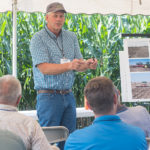 Dean Sponheim is co-owner of Sponheim Sales and Services, which has been offering a “one-stop shop” for cover crop seed and seeding services since 2014. Dean contracts over 1,000 acres of rye and oat production, which he cleans and deploys to airplanes, drills or interseeders.
Dean Sponheim is co-owner of Sponheim Sales and Services, which has been offering a “one-stop shop” for cover crop seed and seeding services since 2014. Dean contracts over 1,000 acres of rye and oat production, which he cleans and deploys to airplanes, drills or interseeders.
As demand for cover crop seed grows across the Midwest, it’s important to know the role cover crop seed businesses play in making cover crop seed more accessible. Learn from Dean Sponheim about where his business started, where it is now and what he thinks those interested in growing and selling cover crop seed in the Midwest should know.
Roundtable: Should We Plant Green? Determining When To Terminate a Rye Cover Crop Around Corn Planting
Wade Dooley
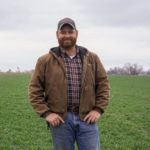 Wade Dooley is a sixth-generation farmer in Marshall County, Iowa, who operates Glenwood Century Farm, a diversified crop and livestock operation focusing on raising cover crop seed. Wade also owns Dooley Ag Stewardship Inc., offering custom cover crop seeding services and seed.
Wade Dooley is a sixth-generation farmer in Marshall County, Iowa, who operates Glenwood Century Farm, a diversified crop and livestock operation focusing on raising cover crop seed. Wade also owns Dooley Ag Stewardship Inc., offering custom cover crop seeding services and seed.
Timing when to kill a cover crop is tricky to pin down. If allowed to grow past corn planting, living cover crops in the field can continue to feed soil microbes and cycle nutrients for the young corn plants. But many farmers have found that planting green can cause yield drag, likely due to the rye cover soaking up too much moisture and nutrients, or from potential seedling pathogens. Join facilitator and cover crop business owner Wade Dooley and other cover croppers for a roundtable discussion of the pros and cons of planting green versus terminating a cover crop prior to planting corn.
Putting Soil Health to the Test in Practical Farmers’ Cooperators’ Program
Stefan Gailans
 Stefan Gailans is the senior research manager at Practical Farmers of Iowa. Stefan leads the Cooperators’ Program, PFI’s vehicle for empowering farmers to generate and share knowledge through timely and relevant farmer-led research. With teammates, Stefan has helped farmers conduct scientific inquiry on a range of topics in over 700 on-farm research trials since 2013.
Stefan Gailans is the senior research manager at Practical Farmers of Iowa. Stefan leads the Cooperators’ Program, PFI’s vehicle for empowering farmers to generate and share knowledge through timely and relevant farmer-led research. With teammates, Stefan has helped farmers conduct scientific inquiry on a range of topics in over 700 on-farm research trials since 2013.
Soil conservation practices like diversified rotations, cover crops and adding grazing livestock are known to improve soil health and nutrient cycling. But can long-term investments by farmers in these practices translate to better yields, lower fertilizer costs or both? Might cover crops improve field conditions for completing timely management? Farmers in PFI’s Cooperators’ Program have been putting these concepts to the test with simple, yet effective, on-farm research. Learn what we’ve been finding and how you could be a part of it.
A Berry Good Choice: Selecting for Plant Diversity in a Prairie Restoration on a Raspberry Farm
Beth and Rick McGeough
 Beth and Rick McGeough own and operate Edge of the Woods Raspberry Farm just outside of Indianola, Iowa. Both have a passion for and commitment to sharing their farm and their land with others.
Beth and Rick McGeough own and operate Edge of the Woods Raspberry Farm just outside of Indianola, Iowa. Both have a passion for and commitment to sharing their farm and their land with others.
Restoring prairie is a long-term project that naturally raises a lot of questions, especially when it’s time for you to decide which plants to include. How do you pick the right species for your location and goals? Higher plant diversity benefits the soil and builds a solid foundation for microbial, plant and wildlife diversity and health. Join Rick and Beth McGeough as they discuss their experiences selecting species for their own 6-acre prairie restoration, and how selecting for biodiversity has benefited their farm. Along with sharing how they chose which plants to use in their restoration, Rick and Beth will discuss early care of your prairie to ensure that diversity stays intact for years to come.
“Lean” Composting
Ben Hartman
 Ben Hartman is the author of “The Lean Farm,” a 2016 winner of the Shingo Institute’s Prestigious Research and Professional Publication Award. He and his wife, Rachel Hershberger, own Clay Bottom Farm in Goshen, Indiana, where they make their living on less than 1 acre growing and selling specialty produce to restaurants and at a farmers market. Ben was appointed to the 2017 Grist 50, a list of emerging green leaders in the United States.
Ben Hartman is the author of “The Lean Farm,” a 2016 winner of the Shingo Institute’s Prestigious Research and Professional Publication Award. He and his wife, Rachel Hershberger, own Clay Bottom Farm in Goshen, Indiana, where they make their living on less than 1 acre growing and selling specialty produce to restaurants and at a farmers market. Ben was appointed to the 2017 Grist 50, a list of emerging green leaders in the United States.
In this session, Ben Hartman will show the four-step “lean” composting method he uses at Clay Bottom Farm, where 100% of fertility is from farm-made compost, at near-zero cost. He will also show methods for anaerobic soil disinfection with compost and in-situ composting, and he will explain how he uses compost in the farm’s no-till deep-mulch system. Anyone can make compost to give your farm a giant boost. Participants will come away with practical tips they can start applying right away.
Stale Bedding and Other Fresh Ideas on Mechanical Weed Control
T.D. Holub, Sam Oschwald Tilton
 T.D. Holub owns and operates Garden Oasis Farm with his wife, Sarah Holub, near Coggon, Iowa. Their farm started in 2013 with a half-acre of vegetable production and has grown to 6 acres of outdoor production and five high tunnels. T.D. and Sarah provide all the farm labor, with just a few seasonal part-time staff, so efficiency improvements through mechanization and crop selection are continuous goals. Garden Oasis Farm markets through CSA, on-farm sales, grocery stores and restaurants.
T.D. Holub owns and operates Garden Oasis Farm with his wife, Sarah Holub, near Coggon, Iowa. Their farm started in 2013 with a half-acre of vegetable production and has grown to 6 acres of outdoor production and five high tunnels. T.D. and Sarah provide all the farm labor, with just a few seasonal part-time staff, so efficiency improvements through mechanization and crop selection are continuous goals. Garden Oasis Farm markets through CSA, on-farm sales, grocery stores and restaurants.
 Sam Oschwald Tilton runs Glacial Drift Enterprises, where he consults with farmers, companies and organizations to improve weed management, draft farm plans and deliver engaging educational programming. Sam has worked in many roles on and around vegetable farms – as a farmhand, running his own CSA and managing an educational farm. He also worked throughout Europe and the U.S. as a sales rep for KULT-Kress weeding tools; was an instructor of sustainable landscape management at Lakeshore Technical College; and served as the direct-market vegetable specialist for University of Wisconsin-Madison Extension. For the past six years, Sam has organized the Midwest Mechanical Weed Control Field Day. He now lives in Minneapolis and enjoys sharing his love of plants with children in his community.
Sam Oschwald Tilton runs Glacial Drift Enterprises, where he consults with farmers, companies and organizations to improve weed management, draft farm plans and deliver engaging educational programming. Sam has worked in many roles on and around vegetable farms – as a farmhand, running his own CSA and managing an educational farm. He also worked throughout Europe and the U.S. as a sales rep for KULT-Kress weeding tools; was an instructor of sustainable landscape management at Lakeshore Technical College; and served as the direct-market vegetable specialist for University of Wisconsin-Madison Extension. For the past six years, Sam has organized the Midwest Mechanical Weed Control Field Day. He now lives in Minneapolis and enjoys sharing his love of plants with children in his community.
Stale bedding is gaining traction. This weed management practice offers the ability to reduce herbicides, hand labor and overall costs related to managing weeds in both conventional and organic systems. Having machinery that tills at the required shallow depth and timing the practice in the midst of a growing season can be hard, but it is one of the best tools available for weed management. If you aren’t familiar with stale bedding (or if you are!), join the discussion – led by Sam Oschwald Tilton and T.D. Holub, two mechanically inclined experts – about the finer points of this underused technique. Then explore more nuts and bolts of mechanical weed control, like types of equipment, timing and other tactics.
Roundtable: Checking In About Rotational Grazing: A Roundtable Discussion
Rebekah Ahrens, Will Ahrens
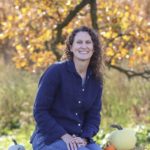 Rebekah Ahrens runs Twisted Oaks near Milan, Illinois, with her husband, Mark, and two teenage children. They raise sheep, goats and laying hens while restoring oak savanna pasture. Rebekah and Mark moved back to Rebekah’s family land having grown up away from the farm and establishing information technology careers.
Rebekah Ahrens runs Twisted Oaks near Milan, Illinois, with her husband, Mark, and two teenage children. They raise sheep, goats and laying hens while restoring oak savanna pasture. Rebekah and Mark moved back to Rebekah’s family land having grown up away from the farm and establishing information technology careers.
 Will Ahrens, a sophomore at Sherrard High School, was 9 when the family moved back to the farm near Milan, Illinois, and his grandpa encouraged him to start his own farm enterprise. For five years, Will operated a laying hen business. In 2024, Will closed that business to focus his time on rotationally grazing Kiko goats in rough terrain. He moves fences, assesses paddock food potential, monitors goat health and does a myriad of other jobs to ensure goats are successful at Twisted Oaks.
Will Ahrens, a sophomore at Sherrard High School, was 9 when the family moved back to the farm near Milan, Illinois, and his grandpa encouraged him to start his own farm enterprise. For five years, Will operated a laying hen business. In 2024, Will closed that business to focus his time on rotationally grazing Kiko goats in rough terrain. He moves fences, assesses paddock food potential, monitors goat health and does a myriad of other jobs to ensure goats are successful at Twisted Oaks.
With one grazing season behind us and another coming up, let’s take this time together to reflect and share how it’s been going. What went well rotationally grazing this year? What new solutions helped you? What didn’t go so well? What are you trying to problem-solve? Let’s talk about rotational grazing successes and challenges to help us all keep stress low and farmers (and their families) resilient – and to maximize the positive impact of livestock on the land.
Making Dollars and Sense With Regenerative Farming
Kevin Fulton
 Kevin Fulton owns and operates Clear Creek Land & Livestock, a holistically managed organic farming and grazing operation in the Loess Hills of central Nebraska. The farm has hosted visitors from around the world and been featured in many publications, documentaries and videos. Kevin has held leadership positions in various farm organizations on state and national levels. He has also lectured at events from New York City to Los Angeles while educating consumers, farmers, advocacy groups and university faculty and students.
Kevin Fulton owns and operates Clear Creek Land & Livestock, a holistically managed organic farming and grazing operation in the Loess Hills of central Nebraska. The farm has hosted visitors from around the world and been featured in many publications, documentaries and videos. Kevin has held leadership positions in various farm organizations on state and national levels. He has also lectured at events from New York City to Los Angeles while educating consumers, farmers, advocacy groups and university faculty and students.
“If you don’t stay in business, nothing else matters,” says Kevin Fulton. So how can you make regenerative practices work from a financial standpoint? Focusing on profitability should take priority. Join Kevin as he uses numbers from his farm to show that regenerative farming practices can be highly congruent with increased profitability. Different strategies can make that happen, but Kevin will share some possibilities.
Mesa Redonda: Ayúdanos a guiar nuestra programación de PFI
Valeria Cano Camacho
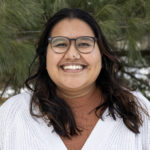 Valeria Cano Camacho se unió al personal de Practical Farmers of Iowa en el invierno de 2023. Es la coordinadora principal de participación latina en el equipo de educación dirigido por agricultores de PFI, donde ayuda al departamento a planificar y facilitar eventos educativos y de creación de redes para agricultores y productores de habla hispana.
Valeria Cano Camacho se unió al personal de Practical Farmers of Iowa en el invierno de 2023. Es la coordinadora principal de participación latina en el equipo de educación dirigido por agricultores de PFI, donde ayuda al departamento a planificar y facilitar eventos educativos y de creación de redes para agricultores y productores de habla hispana.
Únase a nosotros para una mesa redonda sobre el programa de educación dirigido por agricultores de PFI para agricultores. Reflexione sobre los eventos y oportunidades pasados con Practical Farmers, y traiga sus ideas sobre cómo PFI puede servir mejor a los agricultores latinos, negros, indígenas y otros agricultores de color.
Acknowledgements
Thank you to the organizations, business and agencies who provide funding for the PFI Annual Conference:
- ADM
- Cargill
- Cedar Tree Foundation
- Ceres Trust
- Clif Bar
- Farm Aid
- Lifeline
- Oatly
- PepsiCo
- Jessica and Andrew Seija
- Stranahan Foundation
- Unilever
- Vere Initiatives
- Walmart
- Walmart Foundation
- Walton Family Foundation
- National Fish and Wildlife Foundation and the U.S. Department of Agriculture, under agreement number 2004.22.074823
- National Fish and Wildlife Foundation and the U.S. Department of Agriculture, under agreement number 2007.23.076330
- NRCS CIG and Pheasants Forever
- Sub-award funded by Offices of Partnerships and Public Engagement (OPPE)
- U.S. Department of Agriculture and National Fish and Wildlife Foundation, under grant ID 2004.22.075401 and agreement number 75401
- U.S. Department of Agriculture’s (USDA) Agricultural Marketing Service through grant 21FMPPIA1012-00
- U.S. Department of Agriculture, under agreement number NR213A750013G024
- U.S. Department of Agriculture, under agreement number NR216114XXXXG003
- Financial support from U.S. EPA under an Assistance Agreement
This project is made possible through a grant from the National Fish and Wildlife Foundation, with support from NRCS, Cargill, Inc, and Nestle USA, under agreement number 2004.24.081651.
“Any opinions, findings, conclusions, or recommendations expressed in this publication are those of the author(s) and do not necessarily reflect the views of the U.S. Department of Agriculture. In addition, any reference to specific grants or types of products or services does not constitute or imply an endorsement by the U.S. Department of Agriculture for those products or services.”
“USDA is an equal opportunity provider and employer.”
“The views and conclusions contained in this document are those of the authors and should not be interpreted as representing the opinions or policies of the U.S. Government or the National Fish and Wildlife Foundation and its funding sources. Mention of trade names or commercial products does not constitute their endorsement by the U.S. Government, or the National Fish and Wildlife Foundation or its funding sources.”

